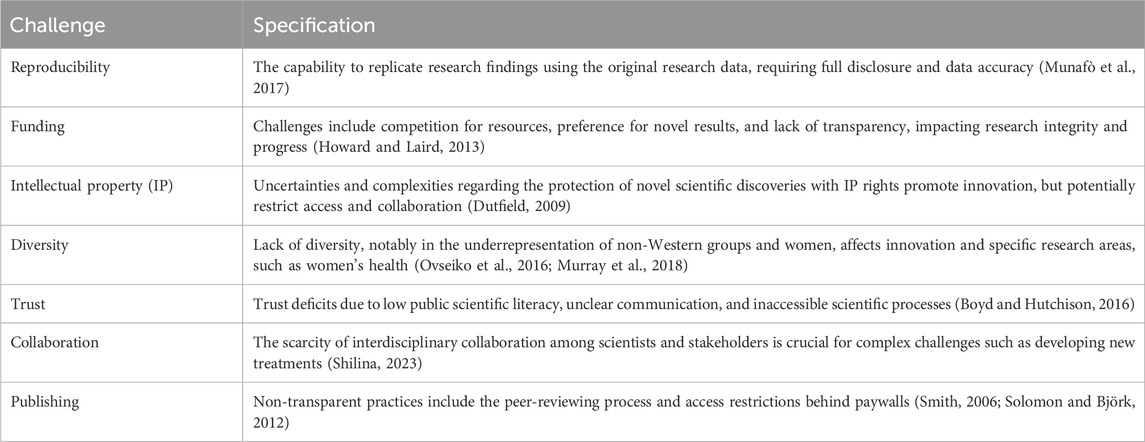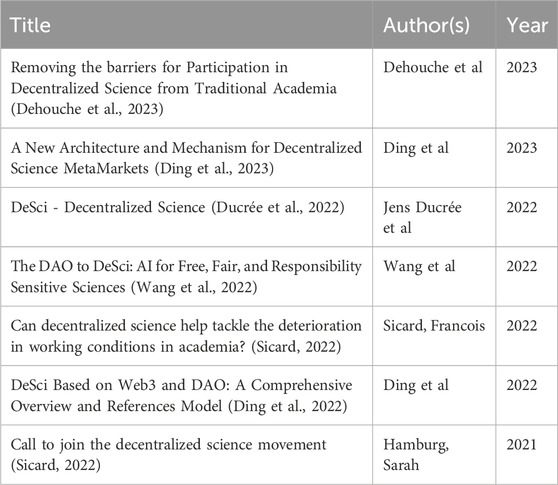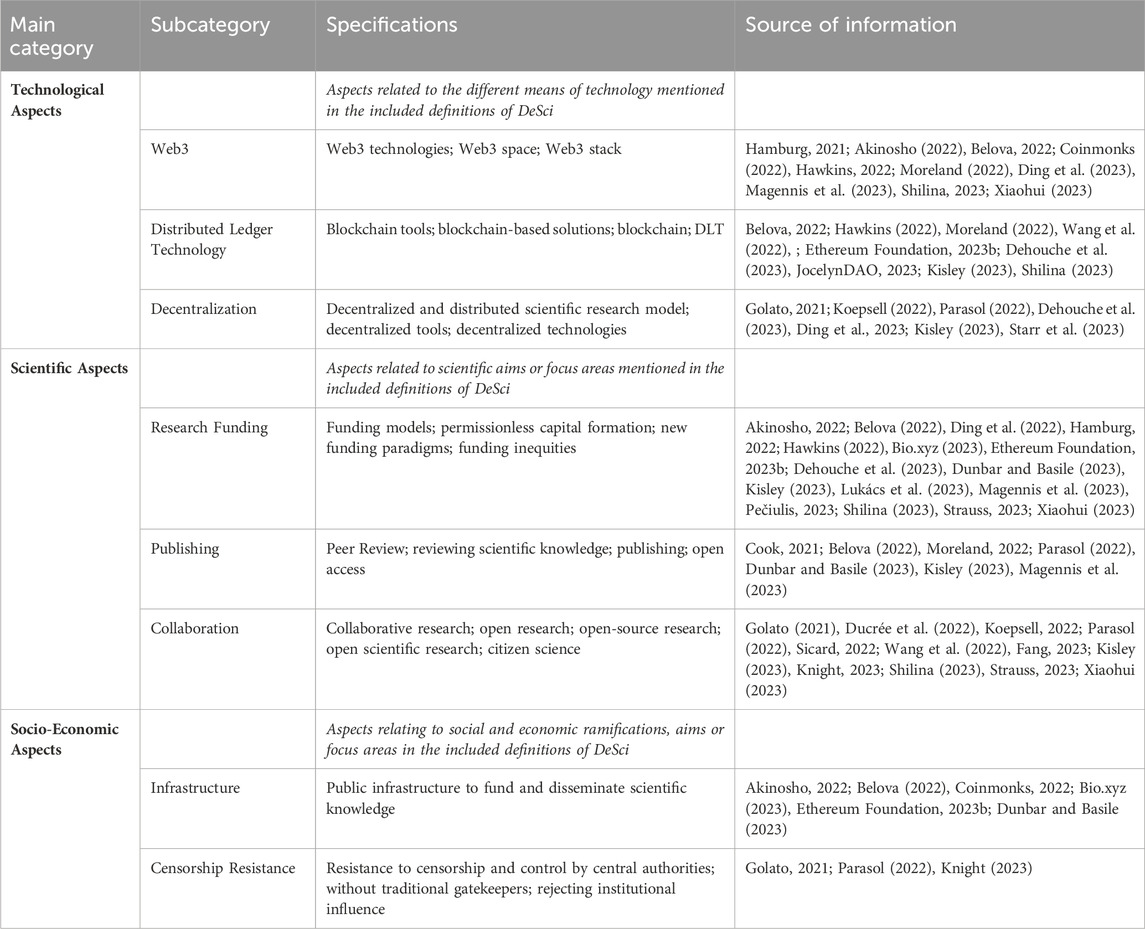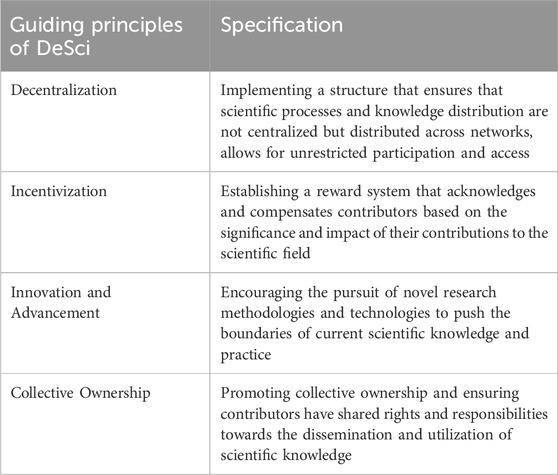- Friedrich Schiller University Jena, Medical Faculty, Jena, Germany
Rapid advancements in Distributed Ledger Technology (DLT), including blockchain, are foundational to a new era of digital innovation. This innovation has catalyzed the emergence of “Decentralized Science (DeSci),” a new concept and movement that aims to address the challenges of modern science. Given the novelty of the field of DeSci, this study aims to provide a comprehensive definition of the term and explore and conceptualize the shared values and guiding principles inherent to DeSci. To achieve these objectives, an exploratory literature review was conducted to identify and synthesize the scholarly and secondary literature. The search and selection process included six databases (PubMed, Google Scholar, Web of Science, IEEE Xplore, arXiv, and Social Science Research Network), focusing on the last 15 years (2008 to 2023). Owing to the novelty of DeSci, the literature review was supplemented by an anonymous online-based expert survey using a combination of single-choice and open-ended questions. The experts were selected based on predefined inclusion criteria related to their activities in the DeSci field. Seven studies were selected for evaluation from the scholarly literature, and additional 24 sources of information were included in the analysis. In the expert survey, 39 valid datasets were collected and analyzed. The synthesis of the exploratory literature review and expert survey results led to a comprehensive definition of “Decentralized Science” (DeSci) reflecting recurring themes. As no publications explicitly discussed or addressed the values or principles of DeSci in the literature review, a set of shared values and guiding principles was defined based on the expert survey results. This study proposes a comprehensive definition of DeSci and a set of shared values and guiding principles, highlighting the importance of future research in this area.
1 Introduction
Rapid advancements in Distributed Ledger Technology (DLT), including blockchain, are foundational to a new era of digital innovation. An emergent and innovative discipline, driven by the technological advancements, is the concept and movement known as ‘Decentralized Science (DeSci).’ DeSci aims to address some of the most pressing challenges of modern science, such as the scientific publishing system, insufficient diversity and interdisciplinary collaboration, and the lack of transparency in funding allocation (Shilina, 2023). Owing to the novelty of the field of DeSci, a comprehensive and inclusive definition of the term has yet to be established. A definition of the term, as well as guiding principles and shared values, is essential as it can serve as the foundation for the expanding DeSci landscape. Considering the anticipated impact and transformative potential of DeSci in the coming years, this study aims to establish a theoretical foundation for an emergent and rapidly evolving field.
2 Theoretical background
The concept of ‘Decentralized Science’ (DeSci) is a novel and complex concept that integrates principles from both decentralization and traditional scientific methodologies. To provide a comprehensive understanding of DeSci, it is essential to first explore the foundational concepts of ‘Decentralization’ and ‘Science’. This chapter aims to create a coherent narrative that links these concepts, highlighting how advancements in decentralized technologies can address contemporary challenges in scientific research. By examining decentralization and science individually, and then synthesizing their principles, this chapter lays the groundwork for understanding the transformative potential of DeSci.
2.1 Decentralization
The Cambridge Dictionary defines ‘decentralization’ as “the act or process of decentralizing an organization or government (= moving control from a single place to several smaller ones)" (Cambridge Dictionary, 2023a). In the context of emerging technologies such as DLT, DAOs, and Web3, decentralization embodies the principle of distributing power, decision-making, and resources across a network of participants. This approach aims to reduce reliance on centralized authorities or institutions, fostering transparency, security, and resilience. Given the importance of decentralization for DeSci, which seeks to leverage these technological advancements to address the inherent challenges in modern scientific practices and enhance the collaborative and transparent nature of scientific research, a more detailed elaboration of key technological concepts is important. Therefore, DLT, DAOs, and Web3 are introduced subsequently to allow a comprehensive understanding of their roles and implications in the context of DeSci.
2.1.1 Distributed Ledger Technology (DLT)
Distributed Ledger Technology (DLT) represents a paradigm shift in data management and information exchange, fundamentally transforming the way transactions are recorded, stored, and verified. At its core, the DLT is characterized by distributed and decentralized systems. It operates as a synchronized database across a network of nodes, each of which holds an identical ledger copy. By utilizing cryptographic techniques and consensus mechanisms, DLT ensures data integrity, security, and transparency. Transactions, once added, become immutable and tamper-evident, fostering trust among the participants (Rauchs et al., 2018). Immutability refers to the fact that recorded transactions cannot be altered without affecting the entire ledger, thereby maintaining a permanent and verifiable record.
In the context of DLT, decentralization refers to the process of dispersing control and decision-making authority from a central entity to multiple, independent nodes or stakeholders. Decentralized systems promote enhanced collaboration, democratic governance, and reduced vulnerability to single points of failure or manipulation. While decentralization often involves distributed architectures, a distributed system is not inherently decentralized because central authorities may still control the allocation of resources or decision-making processes (Rauchs et al., 2018).
While DLT includes various applications, blockchain technology is a prominent example that is particularly important for understanding DeSci. Blockchain technology emerged in 2008 with the release of the Bitcoin whitepaper by an individual or group of individuals using the pseudonym Satoshi Nakamoto (Nakamoto, 2008). At the core of Bitcoin and other subsequent blockchain-based systems is the innovative concept of a decentralized, distributed, and cryptographically secured ledger. A blockchain comprises a series of blocks, each containing a set of transactions, timestamps, and references to the previous block through a cryptographic hash (Bashir, 2017). These blocks are linked together to form a chain that is resistant to tampering and modification.
The success and innovation of Bitcoin have led to the development of numerous other blockchain platforms, such as Ethereum (Buterin, 2014). Ethereum expanded on the capabilities of blockchain technology by introducing the concept of smart contracts, which are self-executing contracts with the terms of the agreement directly written into the code. Smart contracts can be used for a wide range of applications such as automating financial transactions or creating decentralized applications (dApps) (Buterin, 2014). By utilizing smart contracts, dApps can run on the Ethereum blockchain without any central authority or intermediaries. This technological advancement laid the groundwork for the development of Decentralized Autonomous Organizations (DAOs), a novel organizational structure that leverages the benefits of smart contracts (Buterin, 2014).
While the impact of Bitcoin and Ethereum has been significant in the field of blockchain technology, science has been an early focus of many blockchain-based projects. Several blockchain protocols have emerged that aim to incentivize and facilitate scientific research with cryptocurrencies and distributed computing (Kondru et al., 2021). Gridcoin, for example, launched in 2013, is a blockchain-based project that incentivizes users to contribute their computing power to scientific research projects, such as the search for extraterrestrial intelligence or the mapping of the human genome in exchange for the cryptocurrency ‘Gridcoin (GRC)’ (Gridcoin, 2013).
2.1.2 Decentralized autonomous organizations (DAOs)
The emergence of Ethereum and its introduction of smart contracts have enabled the development of Decentralized Autonomous Organizations (DAOs), a novel organizational structure that leverages the benefits of blockchain technology. Utilizing smart contracts, DAOs aim to minimize centralized decision-making and control, such as over shared funds, by distributing power and decision-making authority across a network of participants (El Faqir et al., 2020). The decision-making process in DAOs is mainly based on so-called ‘governance tokens’, which are used to vote on proposals or initiatives. Governance tokens can represent ownership (e.g., of the treasury of the DAO) or a form of access (e.g., for token-gated communities). Treasuries in the context of DAOs, which commonly refer to pooled monetary values, are considered to be one of the key elements of DAOs. Using predefined governance rules and consensus mechanisms, members use their governance tokens to manage treasuries and make decisions on allocating funds for certain activities (El Faqir et al., 2020).
Although the concept of DAOs is relatively new, there has been increasing governmental effort to provide a regulatory background for their registration and operation. For example, in Wyoming, DAOs can operate as limited liability companies (LLCs) and are defined as: “A decentralized autonomous organization (DAO) is a limited liability company with special provisions allowing the company to be algorithmically run or managed (in whole or in part) through smart contracts executed by computers” (State of Wyoming, 2021). This definition highlights the importance of smart contracts for DAOs but does not include other aspects that are often considered important, such as the community, treasuries, or decentralized decision-making.
Another commonly used definition and description of DAOs is: “A DAO is a collectively-owned, blockchain-governed organization working towards a shared mission. (.) They have built-in treasuries that no one has the authority to access without the approval of the group. Decisions are governed by proposals and voting to ensure everyone in the organization has a voice, and everything happens transparently on-chain.” (Ethereum Foundation, 2023a). This definition is more specific and highlights certain characteristics of DAOs, such as transparency in the decision-making process, the existence of a treasury in terms of jointly managed (monetary) assets, and the utilization of blockchain technology.
2.1.3 Web3
Given the anticipated relevance of Web3 in DeSci, it is important to understand the distinction between the terms ‘Web3’ and ‘Web 3.0’. The term ‘Web’ refers to the ‘World Wide Web’, with the so-called ‘static web’ or ‘Web 1.0’ as the first iteration dating back to the early 1990s (Leiner et al., 2009). Web 1.0, which was conceptualized by Tim Berners-Lee and characterized by a rather unilateral flow of information, where users primarily consumed content, with only limited opportunity for the creation of content by its users (Dutfield, 2009). The primary focus of Web 1.0 is to provide a platform for sharing and accessing information (Voshmgir, 2020).
Web 2.0 represented a significant shift from the ‘read-only’ concept of Web 1.0 to the ‘read-write’ concept, characterized by the rise of social media platforms that enabled users to interact with one another and create content (Allen, 2013). Unlike Web 1.0, Web 2.0 is marked by user-generated content and the ability to collaborate, share, and interact with other users (Ethereum Foundation, 2023c).
Although the terms ‘Web3’ and ‘Web 3.0’ are often used interchangeably, there are important differences between them. The concept of Web 3.0, also known as the ‘semantic web,’ dates back to Tim Berners-Lee, and describes a highly interconnected, decentralized, and intelligent version of the World Wide Web that uses technologies such as artificial intelligence (AI) to provide a more personalized user experience (Berners-Lee et al., 2001). The coinage of the term Web3 is predominantly associated with a co-founder of Ethereum, Gavin Wood, and dates back to 2014. Web3 focuses on the aspects of decentralization and ownership through the use of DLT, particularly blockchain technology (Voshmgir, 2020). While both concepts share the vision of a new version of the web that prioritizes decentralization, trustless systems, and user empowerment, they differ in their technological approaches.
Web3’s goal is to create a decentralized and user-centric Internet, where individuals have more control over their data and digital identity. Building on the ‘read-only’ concept of Web 1.0 and the ‘read-write’ concept of Web 2.0, Web3 seeks to develop a new version of the World Wide Web that enables users to ‘own’ digital assets using blockchain technology, cryptocurrencies, and NFTs (Voshmgir, 2020; Ethereum Foundation, 2023c). This ‘read-write-own’ iteration of the web empowers users to not only consume and create content but also take ownership and control of their data and digital assets (Ethereum Foundation, 2023c).
2.2 Science
The concept of ‘science’ has been a fundamental aspect of human civilization for thousands of years, yet there remains some inconsistency in defining the term. The Cambridge Dictionary defines ‘science’ as: “(knowledge from) the careful study of the structure and behaviour of the physical world, especially by watching, measuring, and doing experiments, and the development of theories to describe the results of these activities” (Cambridge Dictionary, 2023c). At its core, science can be understood as the “pursuit of knowledge”, which relies on different principles and values, such as objectivity, replicability, and empirical evidence (Britannica TE, 2023). As this research focuses on DeSci and, in particular, the associated principles and values, it is important to first understand and elaborate on the foundational principles of science. Furthermore, as DeSci aims to address the challenges and difficulties of modern science, subsequent sections will further explore how decentralization might enhance these principles and address the current scientific challenges.
2.2.1 Principles and values of science
Fundamental principles and values have a long history in science. For example, originally published in 1942, Robert K. Merton defined four important norms and principles that “comprise the ethos of modern science”—universalism, communism, disinterestedness, and organized skepticism (Merton, 1973). Universalism underscores the need for objectivity and impartiality in science, emphasizing that scientific knowledge should be evaluated without depending on a scientist’s nationality, religion, race, or other social attributes. Communism, in this context, refers to the openness, accessibility, and transparency of science. Disinterestedness emphasizes the integrity of science, prioritizes the pursuit of truth over personal gain, and discourages unethical practices such as data manipulation. Organized skepticism refers to the necessity of doubt in validating and reviewing scientific knowledge. The “ethos of modern science”, as defined by Merton, can be considered an important milestone in the formulation of more recent guiding principles and shared values of science such as the ‘Recommendation on Open Science’ from the United Nations Educational, Scientific and Cultural Organization (UNESCO) (UNESCO, 2021). While ‘open science’ is subject to a comprehensive introduction (Section 2.2.3), the introduced shared values and guiding principles for open science exemplify the theoretical background for this study. Table 1 shows the adaptation of the shared values of open science (UNESCO, 2021).
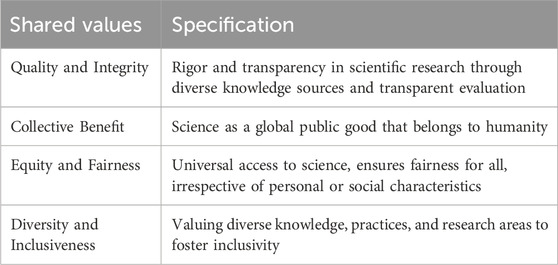
Table 1. Shared values of open science (adapted from (UNESCO, 2021))
While the transition between shared values and guiding principles can be considered fluid, values can be referred to “the beliefs people have, especially about what is right and wrong and what is most important in life, that control their behaviour” (Cambridge Dictionary, 2023d). The understanding that shared values refer to overarching ethos or beliefs is fundamental to this thesis.
Guiding principles are often derived from shared values and provide more actionable tenets or rules. This understanding is exemplified by the definition from the Cambridge Dictionary, defining principle as “a basic idea or rule that explains or controls how something happens or works” (Cambridge Dictionary, 2023b). The UNESCO refers to the guiding principles of open science as “a framework for enabling conditions and practices within which the above values are upheld, and the ideals of open science are made a reality” (UNESCO, 2021). The difference between shared values and guiding principles is further exemplified by the ‘guiding principles for open science’, which are shown in an adapted form in Table 2.
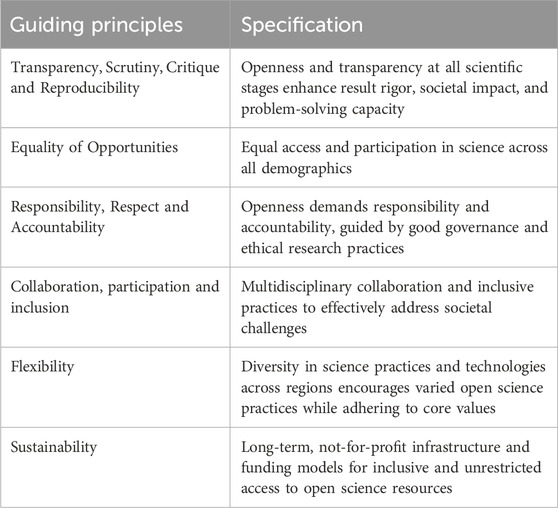
Table 2. Guiding principles of open science (adapted from (UNESCO, 2021))
2.2.2 Challenges and difficulties of modern science
Modern science faces challenges that have the potential to compromise its integrity and progress. The most notable challenges and difficulties of modern science include, but are not limited to, are shown in Table 3.
2.2.3 Open science
The challenges and difficulties of modern science, particularly the scientific publishing system, are considered to be the key driver for the ‘open science’ movement (Suber, 2012). The European Commission refers to open science as “a new approach to the scientific process based on cooperative work and new ways of diffusing knowledge by using digital technologies and new collaborative tools” (European Commission and Directorate-General for Research and Innovation, 2016). Similarly, the Organization for Economic Cooperation and Development (OECD) defines the term open science as: “efforts by researchers, governments, research funding agencies or the scientific community itself to make the primary outputs of publicly funded research results–publications and the research data–publicly accessible in digital format with no or minimal restriction as a means for accelerating research” (OECD, 2015). Both definitions emphasize the importance of collaboration, accessibility, and digital technology in facilitating the dissemination of scientific knowledge. By making research outputs publicly available, open science aims to foster a more inclusive and efficient scientific community, thereby accelerating scientific progress and innovation (Suber, 2012).
Accessibility of scientific knowledge lies at the core of the open science movement, which encompasses other ‘open’ principles, such as ‘open access’ (providing free and unrestricted online access to research articles), ‘open source’ (sharing the source code of software or tools, allowing others to use, modify, and distribute them) or ‘open data’ (making research data freely available and accessible for others to analyze, reuse, and build upon) (European Commission and Directorate-General for Research and Innovation, 2016).
While the open science movement has gained substantial recognition from academia and policymakers, numerous challenges in modern science remain unaddressed, such as funding and intellectual property concerns. Furthermore, although open access is one of the key components of open science, a significant number of articles are not publicly available without cost, indicating that further efforts are needed to fully embrace open science principles and address the remaining challenges in the scientific community (Piwowar et al., 2018).
2.3 Decentralized science
The open science movement and the efforts for increased accessibility of science can be considered fundamental to what is currently known as ‘Decentralized Science (DeSci)’. While the term ‘DeSci’ is claimed to be coined in 2021 (Koepsell, 2022), academic publications on the use of blockchain technology in science precede this term by several years, indicating early interest in the concept (Bartling and Fecher, 2016). In 2018, the idea of “Decentralizing Science” was introduced as the short title of his academic publication “Advancing science through incentivizing collaboration, not competition” (Etzrodt, 2018). Although the terms ‘Decentralized Science’ and ‘DeSci’ are not explicitly mentioned in the publication, it can be regarded as a relevant contribution to the field, particularly considering the relatively few scientific publications on the subject. While the origin of DeSci remains undefined, there are significant parallels between DeSci and the concept of ‘Decentralized Finance (DeFi)’ (Koepsell, 2022). While DeFi emerged and aims to create a more open, transparent, and accessible financial system by leveraging blockchain technology, DeSci is aimed at addressing some of the most pressing challenges in modern science (Zetzsche et al., 2020; Shilina, 2023).
2.3.1 The DeSci landscape
Despite the growing interest in DeSci, leading to the establishment of a variety of new DAOs and projects in the field last year, there is currently no comprehensive scientific or secondary literature available that estimates the size of the DeSci movement. To better comprehend the current DeSci landscape and movement and to illustrate the novelty of the overall concept, Table 4 presents an overview of selected projects and DAOs in the field of DeSci, along with their focus areas and the corresponding number of community members. The number of community members was based on the number of people who joined the Discord channel of the respective DAO or project in the field of DeSci. Discord (https://discord.com/), a messaging and social interaction platform, is commonly used to organize communities within the DeSci ecosystem.
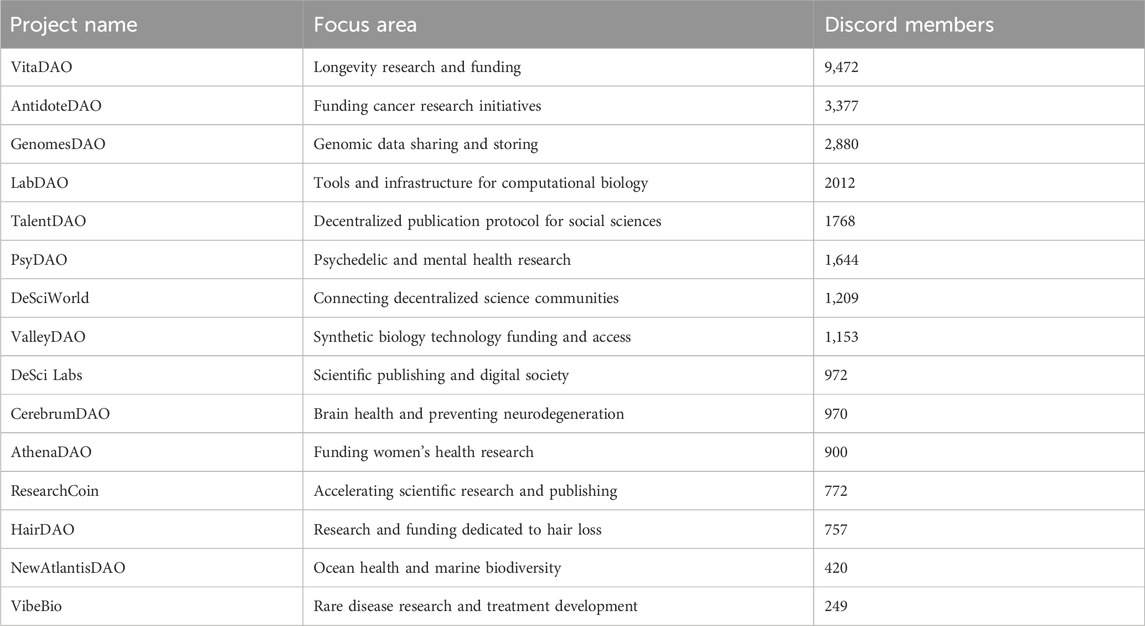
Table 4. Projects and DAOs with a primary focus in the field of DeSci with the associated focus area and corresponding number of community members in Discord as of 22 September 2023.
The numbers representing the quantity of community members should be understood within the context of the data collection date, which was 22 September 2023. Consequently, these values may vary depending on when the data is reviewed. It is also plausible to hypothesize that the number of unique community members could be substantially lower, given the likelihood that most of them are participants in more than one Discord channel. This presumption is further fortified by the understanding that the sole number of community members on a single platform, such as a Discord channel, does not directly correlate with the activity level of those members within a certain community.
At the time of writing, the DeSci landscape was primarily characterized by projects that perceive themselves as DAOs. These entities concentrate predominantly on existing scientific issues (e.g., publishing) and research areas that typically receive insufficient funding (e.g., HairDAO targeting hair loss). One particularly noteworthy DAO in the field of DeSci is VitaDAO. VitaDAO, aside from being one of the largest communities in DeSci (with 9,472 members in Discord as of September 2023), has also been proven to be remarkably influential in shaping the DeSci landscape. In early 2023, VitaDAO announced a successful fundraising round, securing $4.1 million from various contributors, including Pfizer Ventures (VitaDAO, 2023b). This event not only marked the first instance of a DeSci-focused DAO receiving funding from a pharmaceutical company but also the first time a pharmaceutical company actively participated in a DAO’s voting process (Cumbers, 2023).
2.3.2 DeSci-DAOs
DAOs play a crucial role in the current DeSci movement. As previously elaborated, there has been increased effort to define and provide a regulatory background for DAOs. To date, no definition of DAOs has been established in the context of DeSci. These DAOs are hereafter referred to as ‘DeSci-DAOs’ and the following definition will be used as the basis for this study:
“A DeSci-DAO is a decentralized, blockchain technology-based organization that aims to advance scientific knowledge and innovation, by facilitating (interdisciplinary) collaboration, participation, diversity, and communication. DeSci-DAOs leverage smart contracts and tokens to facilitate transparent and tamper-proof blockchain transactions, interactions, and decision-making, ensuring fair and democratic distribution of resources through built-in treasuries and governance mechanisms.”
The provided definition not only serves as the foundation for this study but also offers a comprehensive and scientific explanation of DAOs in the context of DeSci. It encapsulates key aspects of decentralized organizations within the field of decentralized science, emphasizing their goals, mechanisms, and guiding principles. Establishing a precise and comprehensive definition of DeSci-DAOs is essential for the advancement of DeSci. The definition should entail a set of requirements or criteria that an entity must meet to qualify as DeSci-DAO. This clarification is important given that numerous projects in the DeSci landscape self-identify as DAOs yet fail to meet certain criteria of the provided definition.
According to the proposed definition of DeSci-DAOs, numerous projects that identify themselves as DAOs may best be characterized as ‘Decentralized In Name Only’ (DINO) (Song, 2021; VitaDAO, 2023a). The term ‘DINO’ refers to the dichotomy between the decentralization claims of many projects and their high degree of centralization. Notably, the DINO phenomenon is not exclusively limited to DAOs, but represents a broader conceptual issue of blockchain technology-related projects. If we analyze the selected projects listed in Table 1 for the availability of tokens, an essential prerequisite for governance, community participation, and decentralized decision-making, it becomes evident that many projects that label themselves as DAOs fall short of fulfilling this requirement. Table 5 provides a comprehensive overview of selected DeSci-DAOs and projects that self-identify as DAOs, detailing their corresponding Discord member counts and the number of individual token holders. The number of token holders was determined by on-chain analysis using block explorers, such as Etherscan (https://etherscan.io), for tokens issued on Ethereum. Certain types of tokens, such as membership NFTs or funding-related NFTs were excluded from the analysis because of the absence of features that enabled governance or decision-making functionality.

Table 5. DeSci-DAOs and project that self-identify as DAOs with their corresponding Discord member count and the number of on-chain token holders as of 22 September 2023.
Upon analyzing DeSci-DAOs and projects self-identified as DAOs for token availability, it is evident that as of September 2023, numerous projects fail to satisfy this criterion. Table 5 further underscores the disparity between the number of token holders and community members, with the former significantly lower. Moreover, it is important to note that the number of token holders does not directly translate into participation in DAO activities such as governance decisions. For example, taking a closer look at VitaDAO illustrates the disparity between token holders and activities in governance decisions. Analysis of the average number of voters in the second quarter of 2023 (April to June 2023) showed that, on average, only 39 of the 2000 token holders (1.95%) actively participated in the governance processes through voting on governance proposals (VitaDAO reached 2000 token holders on 23.05.2023). While the active participation of token holders in governance processes, as demonstrated by VitaDAO, is a key aspect of decentralization, it is also crucial to remember the strategic approach of progressive decentralization adopted by many DeSci projects Progressive decentralization involves initiating a project with a relatively high degree of centralization, often to facilitate rapid communication and to expedite product/market fit among a select group of founders, while designing it with future decentralization in mind (Walden, 2020). While the concept of progressive decentralization holds promise for the evolution of DeSci-DAOs, the transformation from centralized to fully decentralized entities is an ongoing process.
3 Objective
The main objective of this study was to formulate a comprehensive and representative definition of the term ‘Decentralized Science’ (DeSci) by employing a dual-methodological approach. This involves conducting an exploratory literature review and an online-based expert survey. Furthermore, this study aimed to investigate the shared values and guiding principles inherent in the concept of DeSci. By establishing this definitional framework, this study aims to provide a foundation for facilitating scientific advancement and interdisciplinary discourse in DeSci.
Considering the theoretical background and objective of this study, three guiding research questions can be established:
• How can DeSci be comprehensively and integratively defined?
• What are the shared values underlying the term and concept of DeSci?
• What guiding principles are important in the concept of DeSci?
4 Methods
To answer the research questions, an exploratory literature review and expert survey were conducted.
4.1 Exploratory literature review
Owing to the novelty of the concept and movement of DeSci, an exploratory literature review was conducted to identify and synthesize scholarly and secondary literature.
4.1.1 Search strategy
To identify academic publications relevant to the objective of this study, systematic literature research was performed using six databases according to PRISMA guidelines (Tricco et al., 2018). The databases included in the search were Google Scholar, PubMed, Web of Science, IEEE Xplore, arXiv, and Social Science Research Network (SSRN). The search period was limited to the last 15 years from 2008 to 2023 (incl. September 2023). The search period was based on the publication date of the Bitcoin whitepaper, as the foundation of blockchain technology and decentralization in terms of DeSci.
The databases were chosen for their comprehensive coverage of interdisciplinary and emerging technologies, particularly those related to blockchain, decentralization, and open science. Google Scholar was included for its broad accessibility and extensive indexing of scholarly articles across various disciplines. PubMed was chosen for its focus on the biomedical and life sciences literature relevant to DeSci’s applications in these fields. Web of Science and IEEE Xplore were selected for their extensive archives of peer-reviewed scientific and engineering articles. arXiv was included as a preprint repository, which is widely used in the fields of physics, computer science, and related areas. SSRN was chosen for its emphasis on social sciences and interdisciplinary research, and its frequent use for impactful blockchain-related publications. Other databases, such as ScienceDirect, Scopus, and JSTOR were not included because of their overlapping coverage with the selected databases and access limitations.
Furthermore, to identify relevant secondary literature, three search engines (Google.com, Bing.com, and Yahoo.com) were used. Key words such as ‘Decentralized Science’, ‘DeSci,’ ‘blockchain technology,’ ‘values,’ ‘principles,’ ‘decentralized autonomous organizations,’ and ‘DAO’ were used to identify relevant publications. Boolean operators (AND, OR) were used to narrow the search and create search strings by combining the keywords.
4.1.2 Study selection
After conducting a comprehensive search of the six databases, titles and abstracts of the resulting articles were screened and selected for inclusion. Literature management software (Mendeley; Elsevier) was used to remove duplicates and organize the identified publications. The screening process involved reviewing the titles, abstracts, and full-text articles. Only publications published in English with accessible abstracts were included. Publications that were unsuitable, such as those lacking thematic relevance or with a different focus, were excluded from further evaluation. To supplement the literature search, reference mining was used to identify additional publications. This involved analyzing the reference lists of the selected articles to identify related sources. A detailed overview of the search strategy, including the inclusion and exclusion criteria, can be found in the Supplementary Material.
Given the emergent nature of DeSci, preprint publications were also included in the search strategy to enable a representation of the most current research findings. Although preprints and other non-refereed publications may not carry the same academic weight as peer-reviewed articles, this decision was made to ensure a comprehensive and up-to-date understanding of the field.
4.1.3 Search strategy (secondary literature)
Three search engines (Google, Bing.com, and Yahoo.com) were used to identify relevant secondary literature. Keywords such as ‘Decentralized Science’, ‘DeSci,’ ‘blockchain technology,’ ‘values,’ ‘principles,’ ‘decentralized autonomous organizations,’ and ‘DAO’ were used to identify relevant sources of information. Boolean operators (AND, OR) were used to narrow the search and create search strings by combining the keywords.
Following the search process to identify relevant secondary literature, the full texts of the articles, blog posts, websites, and opinion pieces were systematically accessed and screened for relevance to the study’s predefined research questions. Articles that lacked thematic relevance or were published in languages other than English were also excluded. Secondary literature that only indirectly touched upon the study’s research questions or did not comprehensively address them were excluded. For an article to be included in the subsequent analysis, it must address at least one of the research questions outlined in the framework of this study. The specified inclusion and exclusion criteria for the literature review of secondary literature can be found in the Supplementary Material.
4.1.4 Data extraction
Microsoft Excel (version 16.73) was used to evaluate the identified literature. Data were extracted in accordance with the research questions and study objectives. The extracted data included the title of the scholarly and non-scholarly publication, year of publication, author(s), provided definition of DeSci, shared values, or guiding principles associated with DeSci.
4.1.5 Data analysis
The data extracted from the selected studies were analyzed using thematic synthesis. Line-by-line coding of the extracted data was performed to categorize emergent ideas and concepts. Following the initial coding, the related codes were grouped together to identify overarching themes. Subsequently, the defined themes were synthesized in a narrative format to address the specific research questions of this study.
4.2 Expert survey
An expert survey was conducted using a combination of single-choice and open-ended questions to gain insights into expert perspectives on Decentralized Science (DeSci). This section outlines the methods used for expert recruitment, survey characteristics, data collection, data analysis, and data protection.
4.2.1 Definition of experts
The following criteria were used to define experts in the context of the qualitative expert survey:
• Activity within an organization (including DAO), project, or initiative with a primary focus in the field of DeSci for ≥6 months.
• Activity should be defined as:
⁃ Regular activity within an organization (incl. DAO), a project or initiative in the field of DeSci (e.g., as a steward, community manager, developer, workgroup member)
OR.
⁃ Participation in an organization (incl. DAO), project, or initiative in the field of DeSci in the sense of contributions that are associated with compensation (e.g., compensation in tokens including stable coins like USDC or reputation points)
OR
⁃ Participation in decision-making processes (e.g., governance) within an organization (incl. DAO), project, or initiative in the field of DeSci based on tokens (incl. NFTs)
4.2.2 Expert recruitment
To ensure a diverse group of participants, the survey was shared among various Discord channels of the DAOs, projects, and initiatives focused on DeSci. Additionally, personal contacts within the DeSci community were used to reach potential participants.
4.2.3 Survey characteristics
The survey employed a mix of single-choice and open-ended questions organized into three distinct parts for data collection. The first part, labeled ‘Engagement in Decentralized Science (DeSci),’ features three single-choice questions that evaluate participants based on the criteria for ‘expert status,’ as elaborated in Section 4.2.1. The second part was designed to gather background and professional information from study participants. This part consisted of five single-choice questions and was used to profile the current experts in DeSci. The third part directly addressed the research questions through four open-ended exploratory questions. The complete survey is provided in the Supplementary Material (SM3).
The survey was pretested by three experts in the field of DeSci to validate its comprehensibility and clarity. This pre-testing served two main objectives: 1) to establish the reliability of the survey by ensuring that the questions elicited consistent responses across multiple experts, and 2) to validate that the questions effectively measured what they intended in the context of DeSci. Owing to the specialized nature of DeSci and the limited pool of available experts, a pre-test sample of three was deemed sufficient for this study. Based on the results of the pre-test, an additional statement assessing the professional experience of the participants was added to the survey (statement S3).
4.2.4 Data collection
Data were collected using the online survey tool LimeSurvey (version 6.2.7) from 15 September 2023, to 15 October 2023. The survey was designed to collect both quantitative and qualitative data to gain insight into expert perspectives on DeSci.
4.2.5 Data analysis
The collected data was analyzed using both statistical and content analytical methods. Descriptive methods, such as frequency counts and percentages, as well as measures of central tendency (e.g., mean and median), were primarily used to analyze single-choice questions from the expert survey. This analysis provided insights into the characteristics, demographics, and professional backgrounds of participating experts.
For the open-ended questions in the survey, qualitative content analysis with inductive category formation was conducted according to Mayring’s approach (Mayring, 2021). An adaptation of the step model for inductive category development from Mayring is shown in Figure 1 (Mayring, 2000).
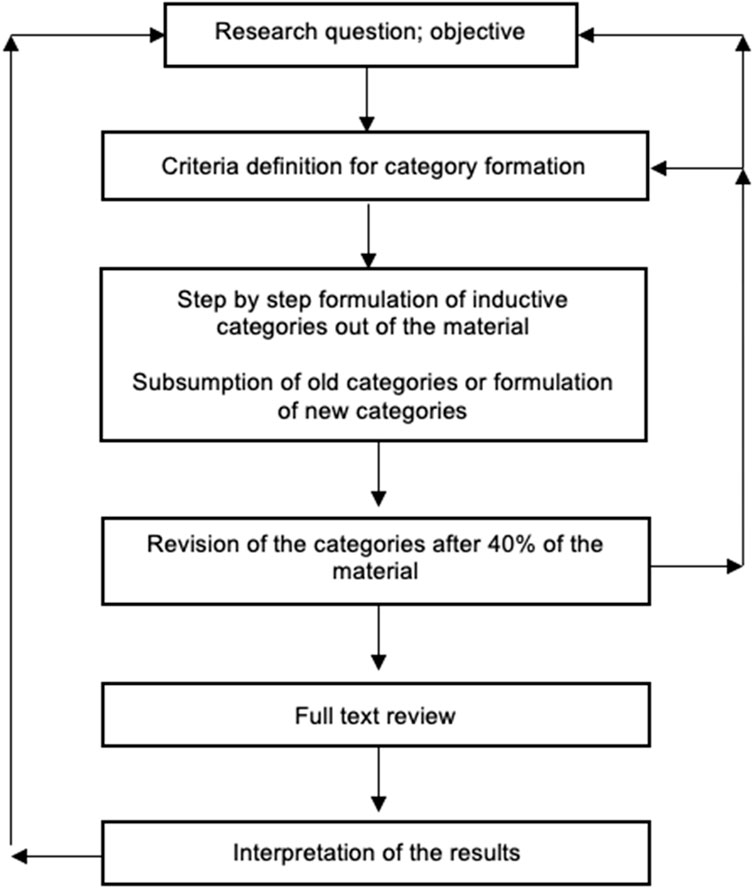
Figure 1. Modified step model for inductive category formation (adapted from (Mayring, 2000)).
The software QCAmap 2020 was used for the coding process, aligning the extracted data with predefined categories (Mayring, 2021). Each piece of extracted data was reviewed and allocated to the most relevant category based on its content. To further deepen the analysis, inductive category formation was employed to create subcategories within the initially defined primary categories. The use of inductive category formation allows for a flexible and open-ended approach to data analysis, while still providing a systematic and rigorous method for identifying and categorizing relevant information. The resulting categories were used to organize and structure the data for further analysis in a way that was relevant to the research questions and objectives of the study.
4.2.6 Data protection
The expert survey was conducted anonymously to protect the participants’ privacy. All collected data was securely encrypted and stored on the servers of the survey provider (LimeSurvey). The evaluated data and results were stored offline on a password-protected storage device in a lockable cabinet with access limited to the researcher. The data will be maintained for 10 years for reproducibility, and subsequently deleted to ensure confidentiality. Prior to the start of the online survey, participants had to consent to the privacy and data protection policies.
4.2.7 Ethics statement
In the context of this research, ethical approval was deemed not applicable because of the theoretical nature of the exploratory literature review and anonymous data collection, which involved no sensitive information and ensured participants' confidentiality and privacy. As the data were collected anonymously, without the saving of potential identifiers such as IP addresses, the possibility of tracing responses back to individual participants was precluded. Data collection adhered to applicable institutional guidelines, exempting research activities from formal ethical reviews when they involve the collection of anonymous data and do not engage with sensitive topics or vulnerable populations.
4.3 Data synthesis
Given the adoption of a dual-methodological approach in this study, synthesizing the results from both the exploratory literature review and expert survey is important to address the study objective. To synthesize the results, the development of a semantic network was selected, which is methodologically outlined in this section.
4.3.1 Semantic network
The semantic network serves as a visual and analytical tool for synthesizing and representing the interconnectedness of the identified themes regarding the definition, shared values, and guiding principles of Decentralized Science (DeSci). The steps foundational to the development of a semantic networks are summarized below:
• Preprocessing: The collected data is summarized and processed, accounting for any spelling mistakes or punctuation signs.
• Grouping: The identified themes are grouped according to their meanings. This step involves organizing themes or concepts based on semantic or thematic similarities.
• Conceptualization: Concepts are identified to form nodes.
• Establishing Connections: Connections of the identified concepts are established based on their co-occurrence.
• Weighting: Nodes are weighted in accordance with their frequency.
• Refinement: The nodes and connections are refined to create an accurate representation of the identified themes and concepts.
4.3.2 Application of the semantic network
To construct and visualize the semantic network for DeSci’s definitions, shared values, and guiding principles, the ‘Nocode functions App’ was employed (Levallois et al., 2012). This process involved preprocessing phase where data were curated for consistency and clarity. Subsequently, the refined data were uploaded into the application, where built-in functionalities allowed for intuitive adjustments and visualization.
5 Results
In this section, the results obtained from the exploratory literature review and the expert survey are presented.
5.1 Exploratory literature review
As part of search and selection process to identify the relevant academic literature, seven studies were included in the evaluation process. The flowchart of the search and selection process is illustrated in Figure 2.
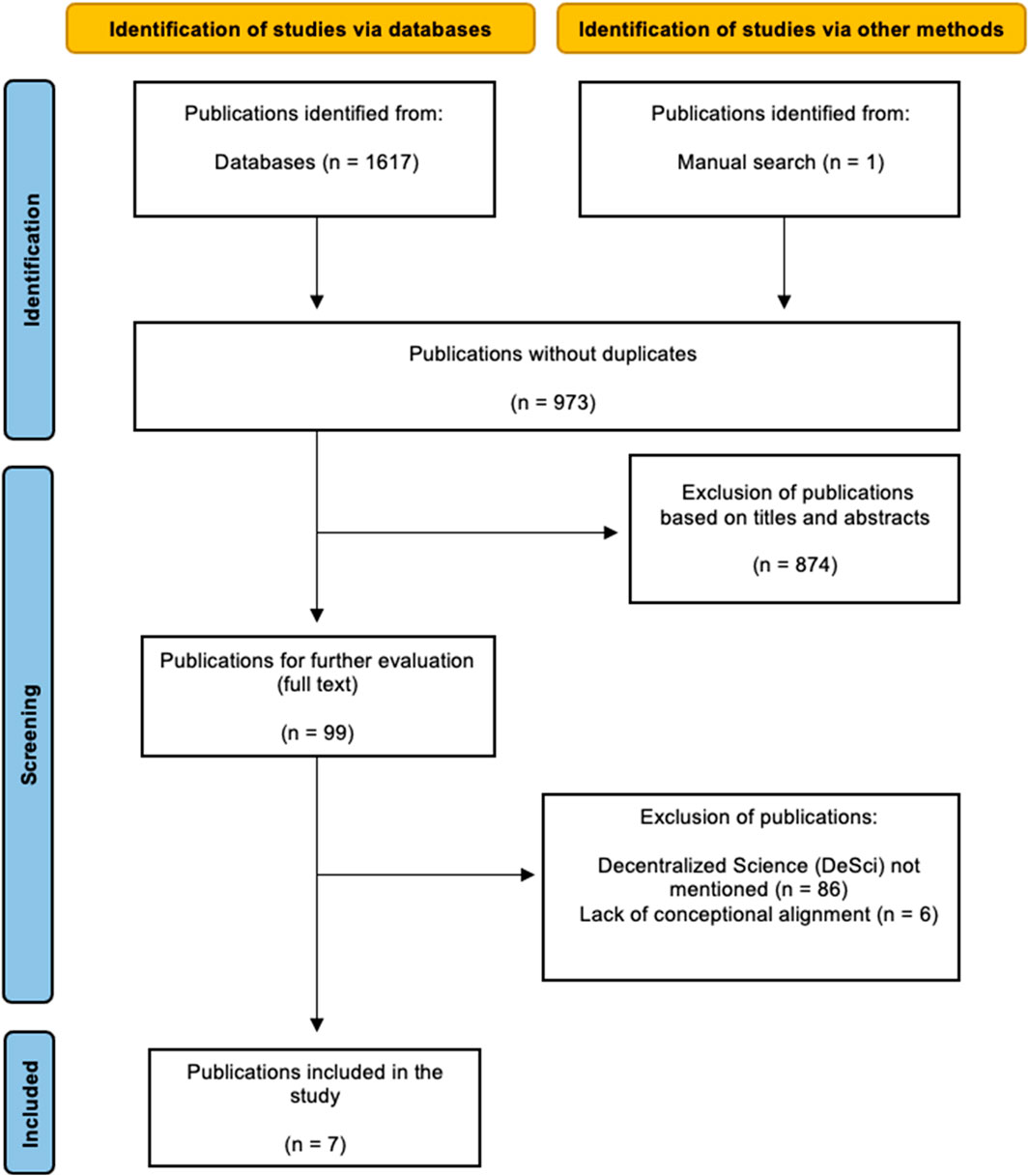
Figure 2. Flowchart of the search and selection process for academic literature (modified from PRISMA (Tricco et al., 2018)).
Although the search parameters were set to span a 15-year period from 2008 to September 2023, all publications included in the evaluation were published within the last 3 years. Two of the included articles had not yet undergone peer review at the time of data collection (Ducrée et al., 2022; Dehouche et al., 2023). Two of the included publications were published by the same first author (Ding et al., 2022; Ding et al., 2023), who was also a co-author of another included publication (Wang et al., 2022). An overview of the identified scholarly publications is presented in Table 6.
During the review of the secondary literature conducted in 2023, information was sourced from 24 articles, blog posts, and websites. The earliest source of information in this dataset dates back to 2021, although the majority were published in 2023 (n = 13). The publication date could not be determined for two included sources of information (Weisser, 2023; Ethereum Foundation, 2023b). The identified secondary sources of information are listed in Table 7.
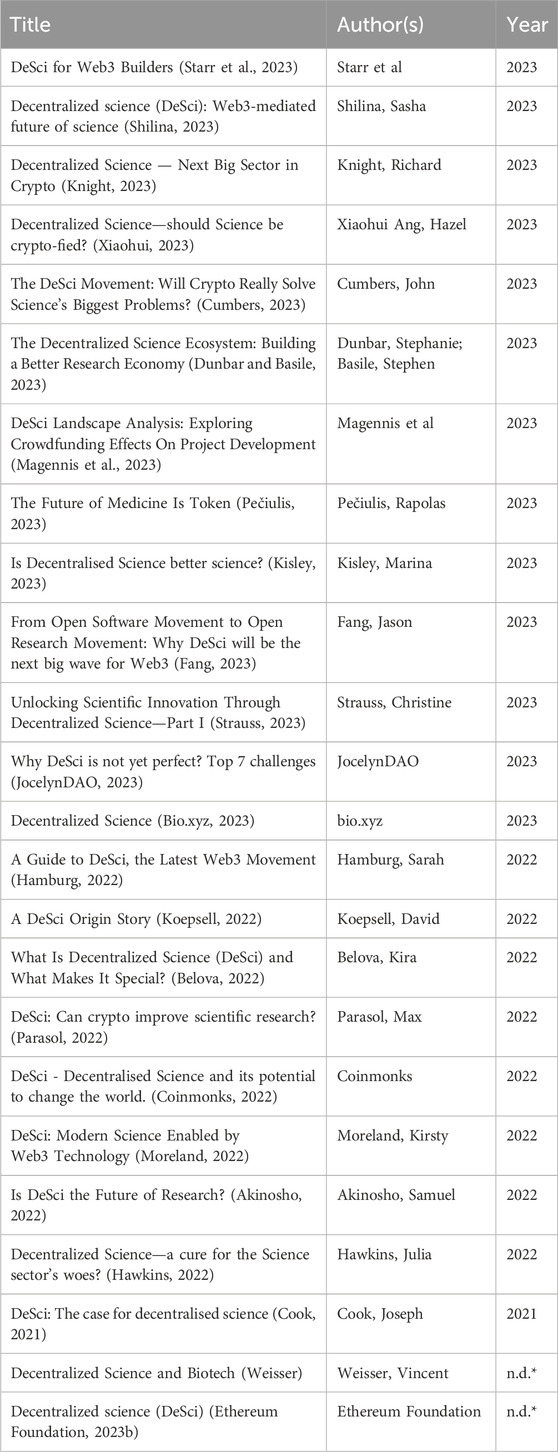
Table 7. Identified and included secondary literature; *n.d.: no date; publication date could not be determined.
5.1.1 Definitions of DeSci
Of the identified 31 scholarly publications and sources of information from secondary literature, all provided definitions of DeSci. Three sources of information (Akinosho, 2022; Coinmonks, 2022; Bio.xyz, 2023) explicitly cited the definition set forth by the Ethereum Foundation, which describes DeSci as “Decentralized science (DeSci) is a movement that aims to build public infrastructure for funding, creating, reviewing, crediting, storing, and disseminating scientific knowledge fairly and equitably using the Web3 stack” (Ethereum Foundation, 2023b). In the paper titled “Call to Join the Decentralized Science Movement,” Hamburg defined DeSci in 2021 as follows: “The decentralized science (DeSci) movement aims to harness new technologies such as blockchain and ‘Web3’ to address some important research pain points, silos and bottlenecks” (Hamburg, 2021). This definition was cited in another definition included in the evaluation (Sicard, 2022).
The recurring themes across the definitions of DeSci were summarized into three main categories, with a total of eight subcategories. Recurring ‘Technological Aspects’ include ‘Web3’ (Hamburg, 2021; Akinosho, 2022; Belova, 2022; Coinmonks, 2022; Hawkins, 2022; Moreland, 2022; Ethereum Foundation, 2023b; Ding et al., 2023; Magennis et al., 2023; Shilina, 2023; Starr et al., 2023; Xiaohui, 2023), ‘Distributed Ledger Technology’ (Hamburg, 2021; Belova, 2022; Hawkins, 2022; Moreland, 2022; Sicard, 2022; Wang et al., 2022; Ethereum Foundation, 2023b; Dehouche et al., 2023; JocelynDAO, 2023; Kisley, 2023) and ‘Decentralization’ (Golato, 2021; Koepsell, 2022; Parasol, 2022; Dehouche et al., 2023; Ding et al., 2023; Kisley, 2023; Starr et al., 2023), whereas scientific aspects frequently cite ‘Research Funding’ (Akinosho, 2022; Belova, 2022; Ding et al., 2022; Hamburg, 2022; Hawkins, 2022; Bio.xyz, 2023; Ethereum Foundation, 2023b; Dehouche et al., 2023; Dunbar and Basile, 2023; Kisley, 2023; Lukács et al., 2023; Magennis et al., 2023; Pečiulis, 2023; Shilina, 2023; Strauss, 2023; Xiaohui, 2023), ‘Publishing’ (Cook, 2021; Belova, 2022; Moreland, 2022; Parasol, 2022; Dunbar and Basile, 2023; Kisley, 2023; Magennis et al., 2023) and ‘Collaboration’ (Golato, 2021; Ducrée et al., 2022; Koepsell, 2022; Parasol, 2022; Sicard, 2022; Wang et al., 2022; Fang, 2023; Kisley, 2023; Knight, 2023; Shilina, 2023; Strauss, 2023; Xiaohui, 2023). ‘Socio-Economic Aspects’, such ‘Infrastructure’ (Akinosho, 2022; Belova, 2022; Coinmonks, 2022; Bio.xyz, 2023; Ethereum Foundation, 2023b; Dunbar and Basile, 2023), and ‘Censorship Resistance’ (Golato, 2021; Parasol, 2022; Knight, 2023) were included in nine of the 31 definitions.
The definitions of DeSci were systematically examined to identify recurring themes, which were then organized into main categories and subcategories. Table 8 displays these categorizations along with the number of sources in which they appear. This table synthesizes the themes mentioned more than once by adopting a methodology intended to capture only those aspects with a higher level of consensus within the current DeSci landscape.
5.1.2 Shared values and guiding principles of DeSci
Despite a thorough examination of all selected sources of information for the shared values or guiding principles of DeSci, no literature could be identified that explicitly discuss or focus on these particular aspects. Two articles highlighted the importance of shared values for DeSci (Hamburg, 2022; JocelynDAO, 2023). The first refers to shared values as a foundation for the emerging decentralized science movement: “DeSci lacks a clear set of shared values. Currently, different segments are defined by the problems they’re attempting to solve. For a new culture within science to emerge, the movement would benefit from rallying behind com-mon principles” (Hamburg, 2022). The non-scholarly publication also highlights the importance of common values for DeSci in addressing open questions such as: “Whom do DAOs serve? Are we going to build an alternative Universe with its economics where every party gets its benefit and the public good is the most? Will it be more sustainable and fair than the current one? Common values of the whole DeSci community will depend on these points” (JocelynDAO, 2023).
5.2 Expert survey
In the period from 15 September 2023, to 15 October 2023, a total of 76 people started the online survey. Of the initial respondents, 39 completed the survey, yielding a dropout rate of 51.3%. All respondents who finalized their participation met the criteria specified in Section 4.2.1, qualifying as experts in this study. The expert status of the participants was self-proclaimed based on these criteria.
Given the methodology used to conduct the expert survey, where the survey was shared within various Discord channels, projects, and initiatives focused on DeSci, the number of people approached can only be estimated. Considering the novel character of DeSci and the defined criteria for being considered an expert, the specialized nature of the participant pool provides a robust foundation for the conclusions drawn. Despite the limited sample size, targeted recruitment ensured that respondents possessed substantial experience and knowledge in DeSci, enhancing the validity of the insights gathered. The significance of the number of participants is further reinforced when considering the typically low number of token holders who actively participate in the governance processes, as discussed in Section 2.3.2.
5.2.1 Engagement in DeSci
The first part of the survey had two objectives: to verify the qualifications of respondents based on the expert criteria set forth in Section 4.2.1, and to explore participants’ level of involvement in the field of Decentralized Science (DeSci).
The first question assessed regular participation in an organization, project, or initiative related to DeSci for 6 months or more. Of the 39 respondents, 35 indicated regular participation, representing 89.7% of all participants. The second question investigated whether respondents had received any form of compensation, such as tokens or reputation points, for their involvement in DeSci activities over the past 6 months. A total of 27 respondents (27/39, 69.2%) confirmed that they had received compensation. The final question in this segment focused on respondents’ involvement in decision-making processes within a DeSci-related organization, project, or initiative. Among the total respondents, 26 out of 39 (66.7%) reported participation in decision-making processes.
5.2.2 Background and professional information
The second part consisted of five statements aimed at collecting demographic (S1), educational (S2), and professional (S3) data. Statements four and five (S4 and S5) were designed to explore involvement in Decentralized Autonomous Organizations (DAOs), focusing primarily on Decentralized Science (DeSci). Statement four was designed to quantify the number of DAOs in which participants held membership, whereas statement five aimed to assess the duration of such involvement.
Criteria for DAO membership relevant to S4 and S5 were explicitly defined: participants had attended at least one community meeting in the past 3 months or had to own one or more governance tokens, including Non-Fungible Tokens (NFTs), of a DeSci-DAO. A comprehensive distribution of the responses, represented as percentages of the total participant pool, is shown in Table 9.
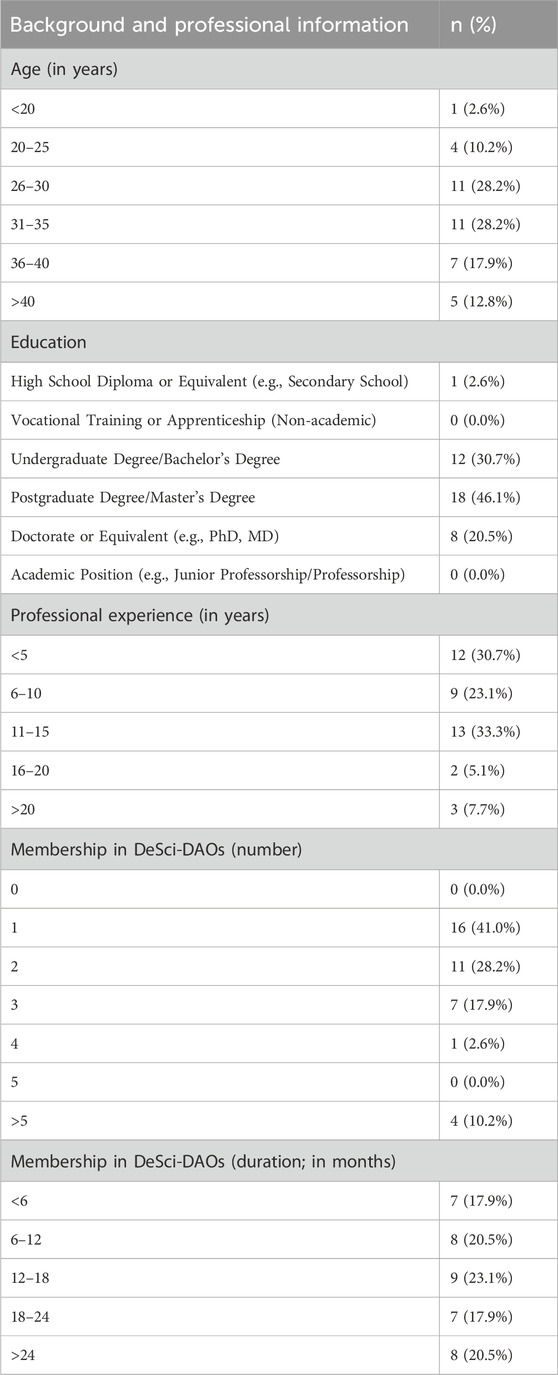
Table 9. Background and professional information of the experts participating and included in the analysis.
The data revealed that the majority of the respondents fell within the 26–30 (28.2%) and 31–35 (28.2%) age ranges, constituting 56.4% of the sample. In terms of the highest level of education achieved, the most frequently reported credentials were the achievement of a postgraduate or master’s degree, captured by 18 of the 39 respondents (46.1%). Notably, none of the participants indicated non-academic education in the sense of vocational training or apprenticeship. Therefore, except for one participant with a high school diploma, all respondents achieved some type of academic qualification. It is noteworthy that professorship is generally not considered a level of education, but was included to reflect that professorship can require additional qualification criteria to be met, such as a successful postdoctoral thesis and lecturing qualification.
Regarding the statement on professional experience, the majority (33.3%) indicated having more than 13–15 years of experience. All participants indicated membership in a DAO with a primary focus on DeSci, based on the specified membership criteria. Furthermore, a substantial proportion of participants (23 of 39, 59.0%) reported affiliations with multiple DAOs. The predominant duration of such involvement was 12–18 months, as reported by nine out of 39 respondents (23.1%).
The demographic data collected highlight that the sample is composed of young to middle-aged adults with advanced academic qualifications and significant professional experience. Widespread membership in multiple DAOs and the duration of involvement reflect a deeply interconnected and active community within DeSci.
5.2.3 Definition of DeSci
The qualitative content analysis of expert responses concerning the definition of DeSci yielded six main categories, further subdivided into 14 subcategories. Employing inductive category formation, these thematic clusters were derived from recurrent motifs within experts’ answers. Table 10 presents a tabulated overview of emergent primary categories and their associated subcategories. Each subcategory is accompanied by a descriptive annotation along with the frequency of its mention in the collected data sample. It should be noted that as some statements aligned with multiple categories, the percentage exceeded 100%.
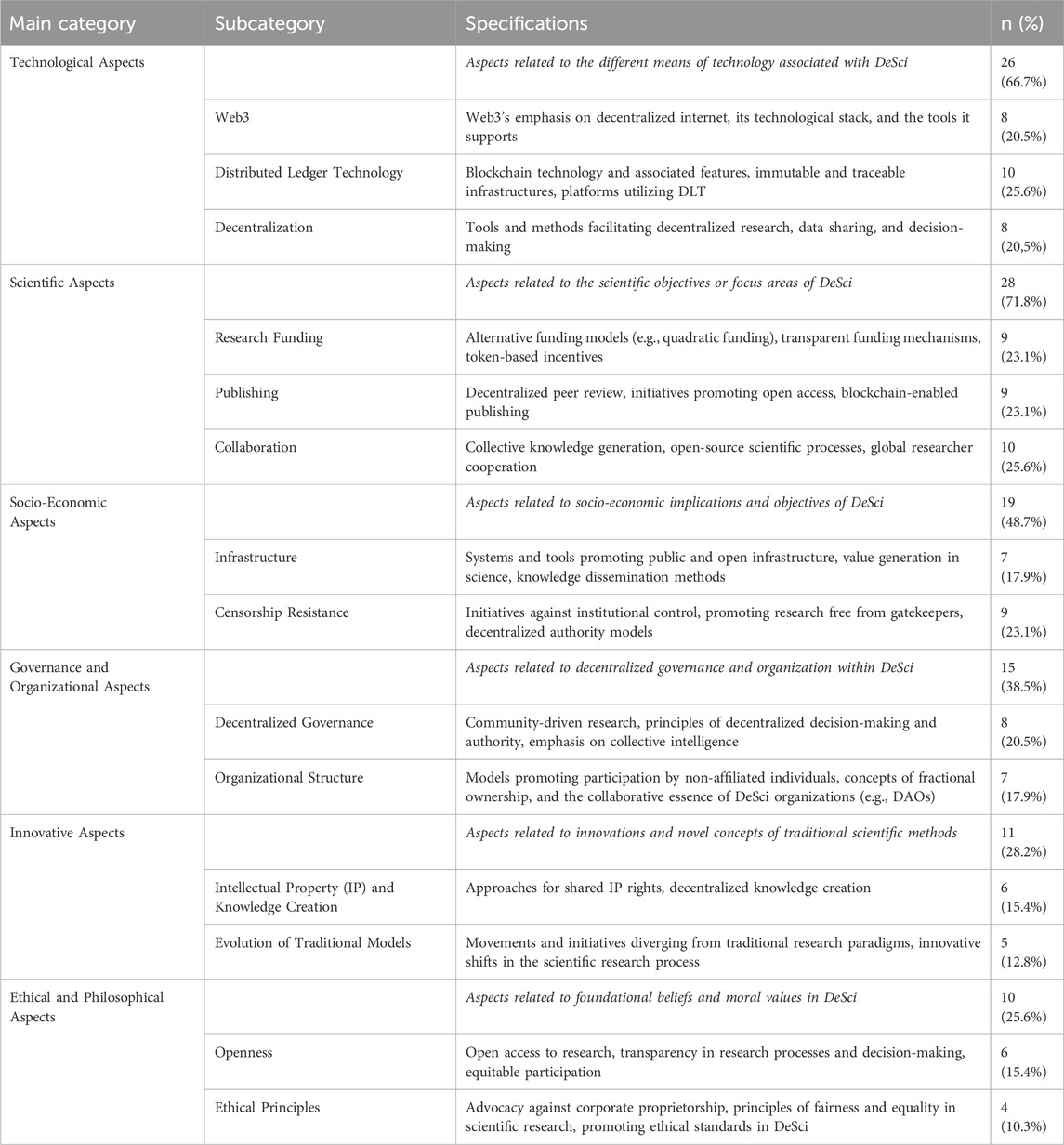
Table 10. Overview of the main and associated subcategories related to the analyzed expert responses concerning the definition of ‘Decentralized Science’ (DeSci) with the quantity and percentage of occurrence.
The category ‘Technological Aspects’ refers to recurring themes related to the different means of technology associated with DeSci, based on the statements provided by the participating experts, which were emphasized by 26 of the 39 experts (66.7%). Within this category, the subcategory of ‘Web3’ reflects the focus on aspects related to Web3 and associated tools referenced by eight of the 39 experts (20.5%). The ‘Distributed Ledger Technology’ subcategory, which includes the attributes of blockchain such as immutable data storage, was acknowledged by 10 experts (25.6%). Another technological emphasis was ‘Decentralization,’ which covers the tools and methods for decentralized research and data sharing, as acknowledged by eight of the 39 experts (20.5%). Each subcategory was anchored to at least one quote from the experts participating in the survey. An overview of exemplary quotes for each subcategory is provided in Table 11.
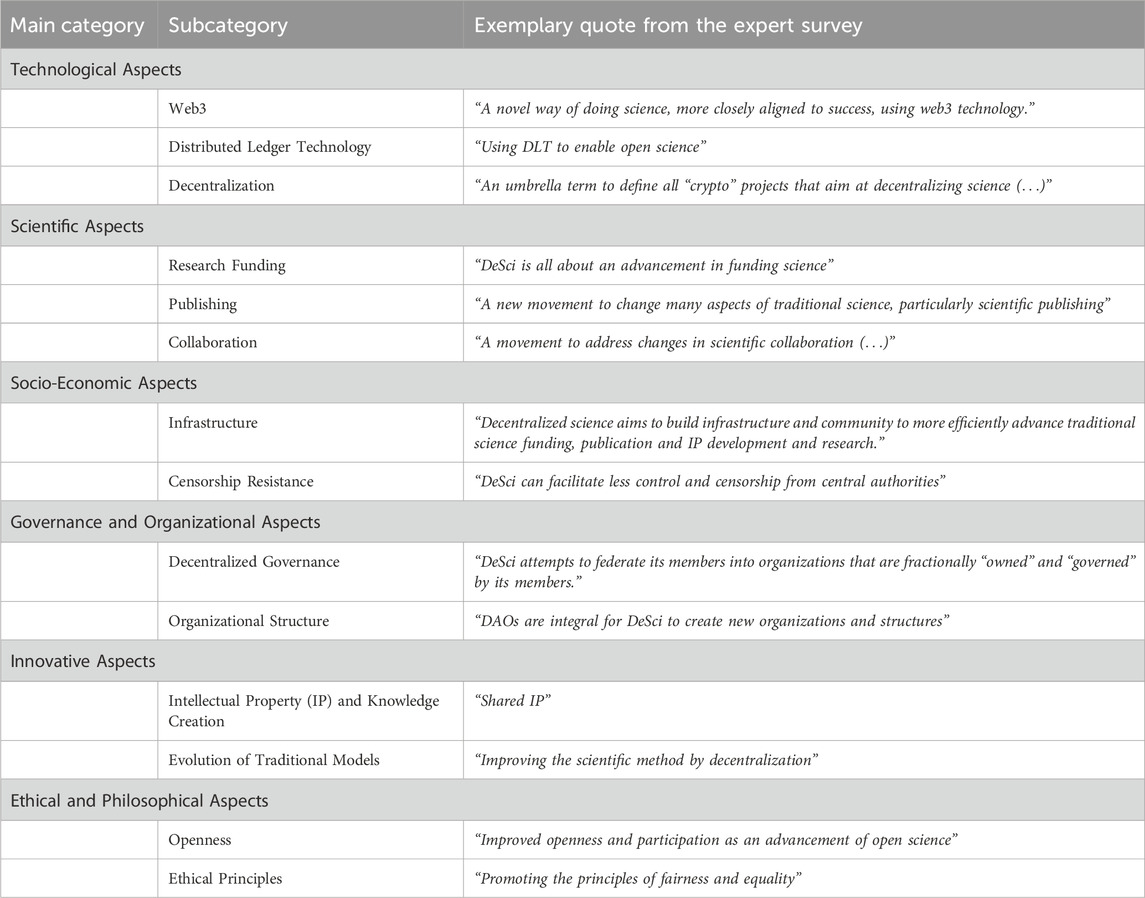
Table 11. Main and associated subcategories with exemplary quotes from the expert survey used for category formation.
The ‘Scientific Aspects’ main category emphasizes the scientific objectives and focus areas in DeSci, as highlighted by the expert statements. This category is divided into three subcategories: ‘Research Funding,’ ‘Publishing,’ and ‘Collaboration,’ and was referred to by 71.8% of the respondents. Specifically, ‘Research Funding’ encompasses transparent funding mechanisms and alternative models, such as token-based incentives, cited by 23.1% of experts. ‘Publishing’ focuses on decentralized peer reviews and blockchain-enabled publishing, also noted by 23.1% of respondents. ‘Collaboration’ involves collective knowledge generation and global cooperation, which is highlighted by 25.6% of the experts. These aspects underscore the critical areas in which DeSci aims to innovate and improve traditional scientific processes.
The ‘Socio-Economic Aspects’ category, addressed by 48.7% of experts, synthesizes the socio-economic implications of DeSci. Within this category, ‘Infrastructure,’ which includes public and open systems, was acknowledged by 17.9% of experts. ‘Censorship Resistance,’ emphasizing decentralized authority and freedom from gatekeeping, was cited by 23.1% of respondents. These aspects highlight the potential of DeSci to democratize access to scientific resources and reduce centralized control.
The ‘Governance and Organizational Aspects’ category, highlighted by 38.5% of respondents, refers to the structural and decision-making elements of DeSci. ‘Decentralized Governance,’ encompassing community-driven research and decentralized decision-making principles, was referenced by 20.5% of experts. ‘Organizational Structure,’ referring to participation by non-affiliated individuals and DeSci organizations like DAOs, was cited by 17.9% of respondents. These aspects reflect a shift towards more inclusive and participatory governance models in scientific research.
The ‘Innovative Aspects’ category consolidates viewpoints on the novel and transformative potential of DeSci, referenced by 28.2% of experts. This category focuses on the evolution of existing scientific models and the creation and sharing of intellectual property. Within this category, ‘Intellectual Property (IP) and Knowledge Creation’ was acknowledged by 15.4% of the experts, whereas the Evolution of Traditional Models’ was highlighted by 12.8%. These insights underline the role of DeSci in fostering innovation and the evolution of traditional research paradigms.
The ‘Ethical and Philosophical Aspects’ category synthesizes responses related to the ethical and philosophical challenges and principles of DeSci mentioned by 25.6% of experts. ‘Openness,’ discussing open access to research and transparency, was cited by 15.4% of respondents. ‘Ethical Principles,’ highlighting aspects of fairness, equality, and ethical standards in DeSci, was emphasized by 10.3% of experts. These considerations reflect the importance of maintaining ethical standards and promoting transparency in DeSci practices.
5.2.4 Shared values of DeSci
To define the shared values of DeSci in accordance with the objectives of this study, the answers provided by the participating experts were synthesized. Table 12 presents an overview of the six categories and their corresponding themes. The cumulative percentage surpassed 100% owing to the multiple categorizations of individual expert answers.
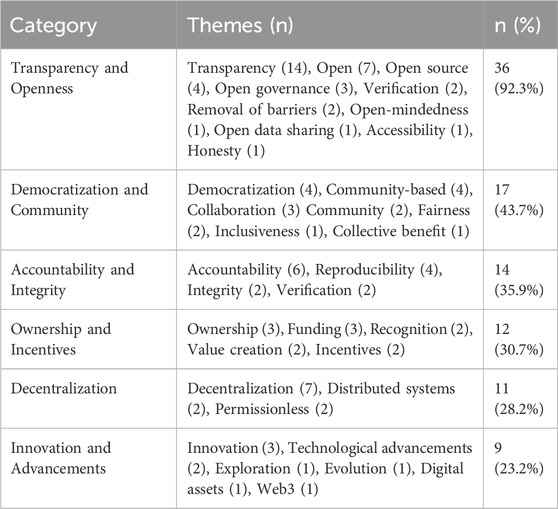
Table 12. Overview of the synthesis of provided expert answers asked about the shared values of DeSci.
The dominant theme, both in frequency and emphasis, was ‘Transparency and Openness,’ referred to by 36 of the 39 experts (92.3%). Within this category, ‘Transparency’ was most commonly referenced (14/39), followed by ‘Open’ (7/39) and ‘Open source’ (4/39). Openness was a predominant theme, especially when summarizing the ‘open values’ (e.g., ‘Open governance’, ‘Open data sharing’), being referenced by a total of 16 of the 39 experts. Similar to the exploration of themes defining DeSci (Section 5.2.3), quotes from the participating experts were foundational to forming categories regarding the shared values of DeSci, as shown in Table 13.
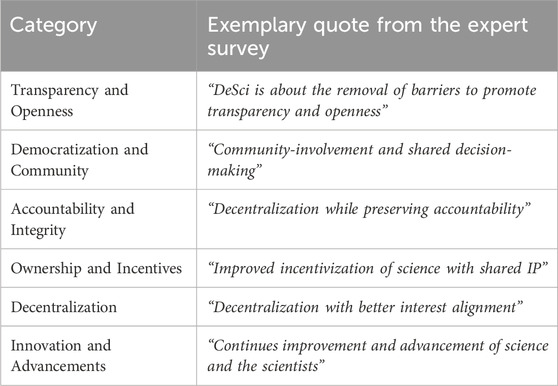
Table 13. Categories with exemplary quotes from the expert survey used for category formation regarding the shared values of DeSci.
The emphasis on ‘Transparency and Openness’ suggests that these values are paramount within the DeSci community, reflecting a strong commitment to accessible and transparent scientific practices. The recognition of ‘Democratization and Community’ by 43.7% of the respondents highlighted the importance of collaborative and inclusive approaches. ‘Accountability and Integrity,’ noted by 35.9% of the experts, underscores the need for reliable and reproducible research. The categories of ‘Ownership and Incentives’ (30.7%) and ‘Decentralization’ (28.2%) indicate a focus on decentralized structures and proper recognition of contributions. Finally, the value placed on ‘Innovation and Advancements,’ cited by 23.2% of respondents, points to a forward-thinking mindset aimed at evolving traditional scientific models.
5.2.5 Guiding principles of DeSci
In accordance with the objectives of this study, which aimed to define the guiding principles of DeSci, a synthesis of the answers provided by the experts was conducted. The synthesis resulted in the definition of five categories, summarizing a total of 27 themes. Table 14 presents an overview of the synthesis that was conducted to define the guiding principles of DeSci. Because some of the answers provided by the experts included multiple themes, the overall percentage exceeded 100%.
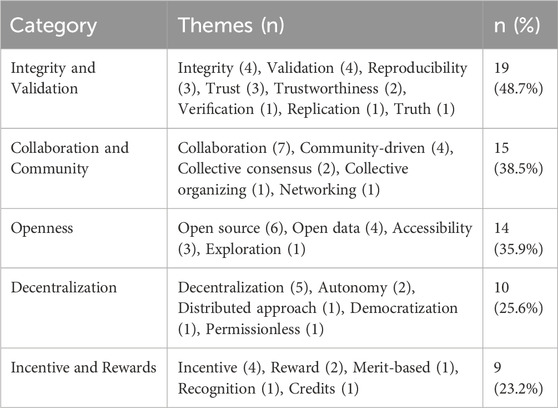
Table 14. Overview of the synthesis of provided expert answers asked about the guiding principles of DeSci.
Themes such as ‘Integrity’ and ‘Validation’, which were both cited by four of the experts, were summarized in one category that was cited by 19 of the 39 experts (48.7%). The ‘Collaboration and Community’ category, referenced by 15 experts (38.5%), underscores the value placed on collective efforts and community-driven initiatives. ‘Openness’ was highlighted by 14 experts (35.9%), emphasizing the need for open-source data and accessible research practices. The category ‘Decentralization,’ mentioned by 10 experts (25.6%), reflects the commitment to decentralized and autonomous approaches. Lastly, ‘Incentives and Rewards,’ cited by nine experts (23.2%), point to the importance of recognizing and rewarding contributions within the DeSci ecosystem. For the formation of each category regarding the guiding principles of DeSci, quotes from the experts participating in the survey were used, as shown in Table 15.
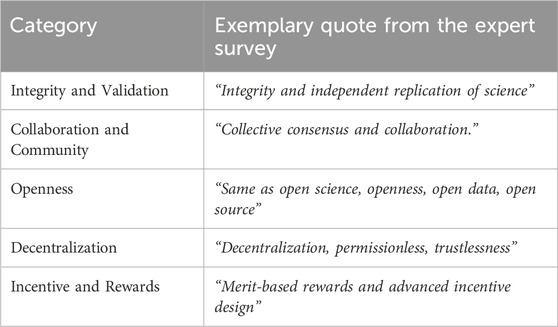
Table 15. Categories with exemplary quotes from the expert survey used for category formation regarding the guiding principles of DeSci.
The guiding principles of DeSci, as identified by experts, illustrate a strong emphasize integrity, collaboration, and openness. These principles are foundational for fostering a trustworthy, community-driven, and transparent scientific environment. The commitment to decentralization further supports the democratization of scientific research, while incentives and rewards ensure the sustained engagement and recognition of contributions.
5.3 Synthesis of the results
The results were synthesized owing to the different methodologies used to answer the research questions of this study. This synthesis will provide the foundation for the subsequent discussion and the conclusion sections.
5.3.1 Defining DeSci
By using the ‘Nocode functions App’ software solution, the definitions identified in the exploratory literature review as well as the responses from the conducted expert survey are synthesized and illustrated (Levallois et al., 2012). The developed semantic network is shown in Figure 3.

Figure 3. Semantic network regarding the definition of DeSci (created with (Levallois et al., 2012)).
The semantic network illustrates the high interconnectedness regarding the definition of DeSci as a result of the synthesized results of the exploratory literature review and expert survey. Based on the synthesized results, the following definition of Decentralized Science (DeSci) is proposed:
Decentralized Science (DeSci) represents a collaborative and decentralized approach to science, leveraging technological and infrastructural advancements such as Distributed Ledger Technology (DLT), Web3, cryptocurrencies, and Decentralized Autonomous Organizations (DAOs) to enable permissionless, open, and inclusive participation, facilitating collective governance, equitable incentivization, unrestricted access, shared ownership, and transparent funding of the scientific process.
5.3.2 Shared values of DeSci
In the absence of directly identifiable shared values of Decentralized Science (DeSci) from the exploratory literature review, the results of the expert survey will be foundational to the subsequent values of DeSci. Notably, modifications to the shared values of DeSci were required as certain expert responses overlapped with the exploration of the guiding principles of DeSci. Aligning with the conceptualization of values as foundational beliefs, recurring themes such as ‘Integrity and Accountability’, ‘Openness’, and ‘Collaboration and Community’ from expert survey responses have been realigned to form the shared values of DeSci. These adjustments ensured a coherent representation of DeSci’s foundational beliefs, as summarized in Table 16.
5.3.3 Guiding principles of DeSci
Similar to the shared values of DeSci, the exploratory literature review did not yield any definitive guiding principles for DeSci. Consequently, insights from the expert survey will be foundational to the development of the guiding principles of DeSci. This synthesis has led to the reclassification of certain themes, acknowledging that principles, unlike values, serve as actionable guidelines. Therefore, ‘Decentralization’ and ‘Ownership’ were transitioned from shared values to guiding principles to better reflect their operational nature. The guiding principles of DeSci were synthesized to provide more practical guidance on how the shared values of DeSci could be realized, as shown in Table 17.
6 Discussion
In the subsequent sections, the results are subject to a detailed discussion to facilitate a nuanced understanding of the study’s implications.
6.1 Defining DeSci
The results from the exploratory literature research clearly underline the novelty of the concept and movement of DeSci, as all identified articles were published after 2021. As the majority of the were published in 2023 (n = 15), with a noteworthy increase from 2022 (n = 12) to 2021 (n = 2), this could imply increasing interest in the topic. This increased interest could be attributed to the success of some DeSci projects, such as Vita-DAO. In this regard, the successful funding of research in the field of longevity or a funding round with participants, such as Pfizer Ventures, is likely to contribute to the recent increase in interest and information published (VitaDAO, 2023b).
All the main and subcategories defined based on the recurring themes identified in the provided definitions of DeSci from the exploratory literature review were reinforced by the conducted expert survey. This implies the high impact of the available literature, such as the definition of DeSci by the Ethereum Foundation, on the understanding and perception of DeSci by the participating experts. The expert survey further extended the results of the literature review by forming three new main categories: ‘Governance and Organizational Aspects’, ‘Innovative Aspects’, and ‘Ethical and Philosophical Aspects’. The main category of ‘Governance and Organizational Aspects’ reflects the increased reference of decentralized governance and decision-making aspects in DeSci, emphasizing new organizational structures, such as DAOs. The explicit reference of DAOs and decentralized decision-making can be seen as a specification of the characteristics native to Web3. This further aligns with the current state of the DeSci ecosystem, where a majority of projects aim to establish themselves as DAOs. The ‘Innovative Aspects’ main category with the subcategories ‘Evolution of Traditional Models’ and ‘Intellectual Property (IP) and Knowledge Creation’ specifically address some of the challenges of the traditional scientific model, such as research funding and IP rights management. Without the opportunity to decentralize and collectively manage IP, such as with novel IP-NFTs (Golato, 2021), the evolution of the traditional scientific process remains difficult. The ability to collectively own, govern, and participate in the revenue sharing of scientific IP can potentially lower the dependency of researchers within the traditional scientific system, leading to new ways of participation and collaboration. The main category ‘Ethical and Philosophical Aspects’ refers to the aspects of ‘Openness,’ such as open access and transparency, that were perceived important by the experts. The importance of aspects related to openness aligns with the understanding that open science is considered to be one of the foundations of DeSci. The ‘Ethical Principles’ refer to the importance of fairness and equality as well as the potentially ethical considerations of DeSci. Potential ethical challenges may include the absence of ethics committees or institutional review boards providing oversight and guidance for scientific research. If the process of scientific research is decentralized, without any ethical oversight, potentially harmful research can be conducted (Lukács et al., 2023).
The results of the exploratory literature review, as well as the expert survey led to the following definition of DeSci in accordance with the first objective of this study: Decentralized Science (DeSci) represents a collaborative and decentralized approach to science, leveraging technological and infrastructural advancements such as Distributed Ledger Technology (DLT), Web3, cryptocurrencies, and Decentralized Autonomous Organizations (DAOs) to enable permissionless, open, and inclusive participation, facilitating collective governance, equitable incentivization, unrestricted access, shared ownership, and transparent funding of the scientific process. While this definition aims to provide a comprehensive and holistic approach to defining DeSci by including the identified and recurring themes from the literature review and expert survey, adaptations might be necessary in the future, owing to the rapid advancements in the field of emerging technologies such as DLT and associated developments such as Web3. Furthermore, the resulting definition of DeSci should be evaluated in the context of the current DeSci ecosystem at the time of this study. The current DeSci ecosystem is strongly focused on natural sciences, such as medicine, biology, and biotechnology, as exemplified by VitaDAO. This context should be considered when evaluating the provided definition because the ecosystem is likely to be substantially reflected in the evaluated literature and responses from expert surveys.
6.2 Shared values of DeSci
In the exploratory literature review, no literature focusing on the shared values of DeSci could be identified. However, two sources of information from secondary literature noted a lack of shared or common values (Hamburg, 2022; JocelynDAO, 2023), with one explicitly highlighting the need for shared values and principles for the new movement of DeSci to emerge: “DeSci lacks a clear set of shared values. Currently, different segments are defined by the problems they’re attempting to solve. For a new culture within science to emerge, the movement would benefit from rallying behind common principles” (Hamburg, 2022). The citation further refers to the early establishment of said values and principles before the movement of DeSci fully emerges and needs to ‘rallying behind.’ Although the early establishment of shared values would be beneficial, the lack of these values is likely attributable to the novelty of the movement. Given the recency of the identified literature on DeSci and the overall size of the current movement with the largest community of a DeSci project, VitaDAO, comprising of less than 10.000 members, the establishment of a clear set of shared values of DeSci might be complicated. Moreover, the limited size of the current DeSci movement was further reinforced by the results of the expert survey. The majority of the 39 participating experts indicated that they were members of two or more DeSci DAOs (23/39; 59.0%), therefore reducing the number of unique members of the current DeSci members even further, strengthening the limited size of the current DeSci ecosystem.
Although no scholarly or non-scholarly literature that explicitly refer to the shared values of DeSci could be identified, it is noteworthy that some definitions of DeSci identified in accordance with the first research question and objective of this study indirectly encompass values. For example, the definition in accordance with the Ethereum foundation: “Decentralized science (DeSci) is a movement that aims to build public infrastructure for funding, creating, reviewing, crediting, storing, and disseminating scientific knowledge fairly and equitably using the Web3 stack” (Ethereum Foundation, 2023b), which includes the values of equality and fairness. While some definitions, such as those from the Ethereum Foundation, indirectly include some values inherent to DeSci, they do not provide a comprehensive or explicit discussion on the shared values of the concept. Given the aim of this study to directly address and analyze the shared values of DeSci, literature that only touched upon these values indirectly through definitions were deemed to lack direct thematic relevance and were subsequently excluded from further analysis.
Foundational to the definition of the shared values of DeSci is the understanding that values represent foundational beliefs rather than actionable guidelines. Following the synthesis of the themes identified regarding the guiding principles of DeSci in the expert survey, a set of shared values of DeSci was defined. During the synthesis, some aspects such as ‘Decentralization’ were excluded from the shared values of DeSci and moved to the guiding principles of DeSci owing to a duplication of results. This duplication of themes may be partially attributable to an unclear distinction between values and principles, which may be further reinforced by the decentralization of DeSci. The possible lack of clarity in this distinction may become even more important to consider, assuming the participation of nonnative English-speaking experts. Given that the transition from values to principles can be considered fluid, duplication of results should be considered in light of a clear distinction and the absence of a comprehensive explanation as part of the survey.
The exploration of shared values in Decentralized Science (DeSci) aims to provide common ground for the advancement of science in a decentralized environment. During the analysis of the results of the expert survey, a high degree of similarity with the shared values of open science became evident. Both DeSci and open science share common values, such as transparency, collaboration, equity, and integrity, which are foundational beliefs about the respective approaches to science. However, despite these similarities, the shared values of DeSci represent a nuanced extension of the shared values of open science driven by the utilization of decentralized technologies.
Integrity, for example, represents a common value for both DeSci and open science. While both approaches emphasize the importance of honesty, reproducibility, and accountability in science, DeSci could decentralize and enhance integrity by using decentralized technologies to secure data and research processes against tampering or manipulation. The use of technology could not only enhance transparency but also ensures the integrity and trustworthiness of scientific data and processes. Compared to the shared values of open science, the main differentiator can be considered the use of technology that aims to enable decentralization.
Therefore, based on the results of this study, the shared values of DeSci can be considered an extension of the shared values of open science, adapted in the context of the emergence of DLT and its associated capabilities. This close relationship is further exemplified by the challenges of modern science, which DeSci aims to solve. For example, the lack of accessibility to publications and the lack of transparency in the reviewing process have been among the focus points of several projects in DeSci (Koellinger et al., 2022; ReserachHub Foundation, 2023). The inaccessibility of scientific publications was criticized even before the emergence of DLT, with ‘open access’ being central to the open science movement.
However, the use of DLT and its inherent capabilities, such as NFTs, DAOs, or cryptocurrencies, can justify the adaptation and extension of open science values, given the new possibilities for decentralized governance or collective ownership. The differences between DeSci and the existing scientific paradigms lie in how these technologies empower individual contributors and communities, offering unprecedented levels of transparency, participation, and efficiency. DeSci aims to revolutionize the accessibility and dissemination of knowledge by facilitating a more inclusive and equitable approach to scientific research. As such, DeSci not only extends the values of open science but also introduces a transformative model for conducting and sharing scientific research, highlighting the importance of technological innovation in shaping the future of science. This evolution signifies a pivotal shift towards a more democratized and collaborative scientific ecosystem, emphasizing the critical role of shared values in driving the success and integrity of DeSci.
6.3 Guiding principles of DeSci
The third objective of this research was to explore and define the guiding principles of DeSci. Similar to the exploration of the shared values of DeSci, no scholarly or secondary literature could be identified that directly addressed or explicitly discussed any principles of DeSci. The guiding principles of DeSci defined in this study are therefore based on the responses of the expert survey, as well as the understanding that principles refer to more actionable tenets and guidelines compared to shared values.
The guiding principles of Decentralized Science (DeSci) are intrinsically linked to its shared values, serving as an actionable framework that operationalizes these values within the scientific community. Owing to the duplication of themes identified in the analysis of the experts’ responses to the shared values and guiding principles of DeSci, the guiding principles defined in this study represent a modification of the results from the expert survey. In this regard, recurring themes related to ‘Integrity and Validation’ were transferred and merged with the shared values of ‘Accountability and Integrity.’ Given that the guiding principles aim to provide more actionable guidelines, enabling a more practical realization of shared values, the guiding principles of DeSci underscore the importance of decentralization, ownership, and incentivization. Focusing on the shared value of ‘Openness and Transparency,’ emerging technology enabling increased decentralization such as DLT, can be used to ensure that scientific data and processes are transparent and open for analysis, thus enhancing accountability and integrity in research. By implementing a public ledger for scientific data and peer review processes, DeSci aims to support unprecedented levels of openness, allowing every action and transaction to be transparently recorded and accessible to all, thereby promoting a more inclusive and equitable scientific ecosystem.
The guiding principles of DeSci can be considered not just theoretical, but also practical guidelines to facilitate compliance with shared values and address some of the challenges of modern science, such as a lack of accessibility, limited and potentially biased funding mechanisms, and limited potential for collaboration, ownership, and rewards. Decentralization, as a guiding principle, reallocates authority and decision-making power from centralized entities to a distributed network of participants, enabling a more democratic and participatory approach to scientific research. Furthermore, principles such as ownership and incentivization, facilitated by technologies such as smart contracts and tokens, offer direct incentives to contributors, promoting transparency and equity. This could not only accelerate the pace of innovation, but also ensure that contributors are recognized and rewarded for their work, challenging the traditional metrics of success and impact in science.
Comparing these principles with the broader open science movement, the utilization of technologies for enhanced decentralization marks a distinct advancement from the guiding principles of open science. While UNESCO refers to the guiding principles of open science as “a framework for enabling conditions and practices within which the above values are upheld, and the ideals of open science are made a reality”, it lacks specific recommendations for implementation, particularly in a technologically evolving landscape (UNESCO, 2021). The guiding principles of DeSci, leveraging decentralized technologies, could provide a specific pathway not only for the shared values of DeSci but also for the shared values of open science.
For example, the use of DLT and its capabilities, such as smart contracts and dApps, enable the formation of DAOs, which are predominant in the current DeSci ecosystem. Focusing on VitaDAO, for example, the use of DLT to facilitate decentralization enables incentivization of contributions, by promoting collective ownership and governance. Therefore, the guiding principles of DeSci enable transparency in how people are incentivized and rewarded, embracing openness, collaboration, and inclusivity. As the shared values of DeSci share high similarity with those of open science, the use of DLT also contributed to enabling ‘Equity and Fairness’ as well as ‘Diversity and Inclusiveness.’
Therefore, while a high degree of similarity between the shared values and guiding principles of DeSci and open science is evident, the proposed guiding principles of DeSci, based on the results of the expert survey, further highlight the important differences centered around decentralization.
As the guiding principles of DeSci are defined solely based on the responses from the expert survey, the results need to be critically evaluated. Although DeSci aims to include a diverse set of different stakeholders, the results of the expert survey indicate that experts in the current DeSci ecosystem tend to possess a considerable level of education, which may result in collusion. Except for one participant with a high school diploma or equivalent, all experts indicated that they had obtained an undergraduate degree or higher (38/39, 97.4%). Furthermore, the professional experience of the participating experts, with the majority indicating a professional experience of 6 years or more (27/39, 69.2%), could imply that a certain level of seniority associated with sufficient financial compensation is needed to allow active participation in the current DeSci ecosystem. This could be attributed to insufficient and immature compensation mechanisms and opportunities in the current DeSci ecosystem, in addition to the complexities of receiving compensation from DAOs. For example, even if a DAO is incorporated in Wyoming or Delaware based on existing legal structures, receiving compensation for non-US residents might be complicated with regard to tax, health insurance, and pension.
6.4 Limitations
Although this study provides a comprehensive exploration of the emerging field of Decentralized Science (DeSci), there are several limitations to be considered. The limited availability and recency of the literature and available information on DeSci, with the majority of publications published in 2023, can be seen as a limitation of this study. While a diverse range of information, including blogs, articles, reports, and websites, was included to supplement the limited academic literature, it is essential to acknowledge that these sources may vary in rigor and credibility when compared with peer-reviewed academic literature. Potential relevance and quality limitations should also be acknowledged given the inclusion of non-peer-reviewed publications.
Another limitation is the gap in literature regarding the values and principles of DeSci. As no sources of information that explicitly discusses or covers either the values or principles of DeSci could be identified, the analysis relied solely on the results of the expert survey. While offering invaluable insights, this survey introduces its own set of challenges and possible limitations. The dissemination of the survey link primarily within the DeSci community by the researcher raises concerns regarding selection bias. There is also the potential for biases stemming from the chosen experts, as their individual experiences may not encompass the breadth and depth of the DeSci community. Additionally, there is a risk of limitations because of the survey itself, such as the cutoff age of 40 years, which may have excluded valuable perspectives from older participants. Given the decentralized nature of DeSci, there may be additional limitations owing to the language used, as not all participants may be fluent English speakers. Moreover, given the limited number of participating experts, the generalizability of the findings on a global scale is further limited. A possible response bias, in which the participating experts responded in a way deemed socially acceptable or favorable rather than providing their genuine perspective, could further limit the results of this study. Technical constraints during the survey administration, data collection, and subsequent analyses should be considered. Furthermore, biases stemming from the researcher’s own perspectives and experiences might have impacted the objectivity of data interpretation.
Additionally, this study acknowledges the limitations inherent in the methodological approach, particularly in the coding of qualitative data. While the coding for this study was only conducted by a single researcher, efforts were made to adhere to established coding guidelines and transparently report the coding process to mitigate potential biases. However, the absence of a second coder may impact the objectivity and generalizability of the qualitative analysis, a limitation that future research could address by incorporating a multi-coder approach to enhance the validity and reliability of the results.
Moreover, the present focus of the DeSci ecosystem on natural sciences may have influenced the findings. Consequently, insights or practices from other scientific disciplines may be underrepresented, potentially limiting the comprehensiveness of the results of this study. Finally, considering the rapidly evolving nature of DeSci, the results, conclusions, and definitions presented in this study may require future revisions, which underscore the importance of ongoing evaluation, validation, and adaptation.
7 Conclusion
This study aimed to explore the emerging field of Decentralized Science (DeSci), focusing on its definition, shared values, and guiding principles. The novelty of DeSci is apparent based on the limited number of publications identified in the exploratory review. The results further underscore the key themes and concepts associated with the current definitions of DeSci, such as Web3, decentralization, research funding, and collaboration. Furthermore, the lack of publications that explicitly discuss or focus on the shared values or guiding principles of DeSci underscores the emerging nature of DeSci.
Owing to the limited number of available scholarly and non-scholarly publications on DeSci, an expert survey was conducted to allow for a more comprehensive exploration of the study objectives. The insights from experts reinforced the results of the literature review and highlighted the importance of new key aspects relevant to DeSci, such as governance, innovation, and ethical considerations. Consequently, this study proposes a comprehensive definition of DeSci that reflects its collaborative and decentralized ethos. However, this definition, primarily shaped by the current DeSci ecosystem and focusing on natural sciences, requires continual reevaluation to remain relevant.
Based on the results of the expert survey, shared values and guiding principles of DeSci were defined. The proposed shared values of DeSci, including universal openness, transparency, integrity, and shared ownership, aim to form the foundation for its evolution. The identified and defined guiding principles of DeSci include aspects related to collaboration, decentralization, incentivization, and verification. In addition to the overarching concept of shared values for the community and organizations in DeSci, the defined guiding principles aim to provide more actionable guidelines. While the results of this study offer valuable insights into the emerging field of Decentralized Science, they highlight the lack of existing literature and the clear need for future research on DeSci.
Data availability statement
The raw data supporting the conclusions of this article will be made available by the authors, without undue reservation.
Author contributions
LW: Conceptualization, Data curation, Formal Analysis, Funding acquisition, Investigation, Methodology, Project administration, Resources, Software, Supervision, Validation, Visualization, Writing–original draft, Writing–review and editing. CS: Conceptualisation, Methodology, Supervision, Validation, Writing–review and editing.
Funding
The author(s) declare that no financial support was received for the research, authorship, and/or publication of this article.
Acknowledgments
A preprint version of this research has been submitted to Preprints.org: Weidener, L. Decentralized Science (DeSci): Definition, Shared Values, and Guiding Principles. Preprints 2024, 2024011638. https://doi.org/10.20944/preprints202401.1638.v1. The author expresses sincere gratitude to all the survey participants for their valuable contributions. This gratitude further extends to anyone who shared or referred the survey, supporting the research process.
Conflict of interest
The authors declare that the research was conducted in the absence of any commercial or financial relationships that could be construed as a potential conflict of interest.
Publisher’s note
All claims expressed in this article are solely those of the authors and do not necessarily represent those of their affiliated organizations, or those of the publisher, the editors and the reviewers. Any product that may be evaluated in this article, or claim that may be made by its manufacturer, is not guaranteed or endorsed by the publisher.
Supplementary material
The Supplementary Material for this article can be found online at: https://www.frontiersin.org/articles/10.3389/fbloc.2024.1375763/full#supplementary-material
Abbreviations
CeSci, Centralized Science; DAO, Decentralized Autonomous Organizations; DApps Decentralized Applications; DeFi, Decentralized Finance; DeSci, Decentralized Science; DINO, Decentralization In Name Only; DLT, Distributed Ledger Technology; GRC, Gridcoin; IP Intellectual Property; IP-NFT, Intellectual Property Non-Fungible Token; LLC, Limited Liability Company; n.d., no date; NFT, Non-fungible Token; OECD, Organization for Economic Cooperation and Development; SSRN, Social Science Research Network.
References
Akinosho, S. (2022). Is DeSci the future of research? Available at: https://hackernoon.com/is-desci-the-future-of-research (Accessed December 12, 2023).
Allen, M. (2013). What was Web 2.0? Versions as the dominant mode of internet history. New Media and Soc. 15 (2), 260–275. doi:10.1177/1461444812451567
Bartling, S., and Fecher, B. (2016). Blockchain for science and knowledge creation. doi:10.5281/ZENODO.60223
Belova, K. (2022). What is decentralized science (DeSci) and what makes it special? Available at: https://pixelplex.io/blog/what-is-decentralized-science-detailed-guide/(Accessed December 12, 2023).
Berners-Lee, T., Hendler, J., and Lassila, O. (2001). THE SEMANTIC WEB. Sci. Am. 284 (5), 34–43. doi:10.1038/scientificamerican0501-34
Bio.xyz (2023). Decentralized science. Available at: https://docs.molecule.to/bio.xyz/biodao-bible/decentralized-science (Accessed December 12, 2023).
Boyd, L., and Hutchison, E. (2016). Science literacy: concepts, contexts, and consequences. Washington, DC: The National Academies Press. doi:10.17226/23595
Britannica TE (2023). Science | definition, disciplines, and facts | britannica. Available at: https://www.britannica.com/science/science (Accessed December 12, 2023).
Buterin, V. (2014). A next-generation smart contract and decentralized application platform. Available at: https://blockchainlab.com/pdf/Ethereum_white_paper-a_next_generation_smart_contract_and_decentralized_application_platform-vitalik-buterin.pdf (Accessed December 12, 2023).
Cambridge Dictionary (2023a). Decentralization | English meaning - Cambridge dictionary. Available at: https://dictionary.cambridge.org/dictionary/english/decentralization (Accessed December 12, 2023).
Cambridge Dictionary (2023b). Principle | English meaning - Cambridge dictionary. Available at: https://dictionary.cambridge.org/dictionary/english/principle (Accessed February 06, 2024).
Cambridge Dictionary (2023c). Science | English meaning - Cambridge dictionary. Available at: https://dictionary.cambridge.org/dictionary/english/science (Accessed December 12, 2023).
Cambridge Dictionary (2023d). Value | English meaning - Cambridge dictionary. Available at: https://dictionary.cambridge.org/dictionary/english/value (Accessed February 06, 2024).
Coinmonks (2022). DeSci - decentralised Science and its potential to change the world. Available at: https://medium.com/coinmonks/desci-decentralised-science-and-its-potential-to-change-the-world-f00761d420a9 (Accessed December 12, 2023).
Cook, J. (2021). DeSci: the case for decentralised science. Available at: https://tothepoles.co.uk/2021/09/14/desci-the-case-for-decentralised-science/ (Accessed December 12, 2023).
Cumbers, J. (2023). Longevity startup VitaDAO raises $4. 1m, Backed By Pfizer, Balaji Srinivasan. Available at: https://www.forbes.com/sites/johncumbers/2023/01/30/longevity-startup-vitadao-raises-41m-backed-by-pfizer-balaji-srinivasan/?sh=75a5a7595e6a (Accessed December 12, 2023).
Dehouche, N., Koury, J., Della Ventura, L., Blythman, R., and Hamburg, S. (2023). Removing the barriers for participation in decentralized science from traditional academia. doi:10.55277/ResearchHub.8c7ndflk
Ding, W., Hou, J., Li, J., Guo, C., Qin, J., Kozma, R., et al. (2022). DeSci based on Web3 and DAO: a comprehensive overview and reference model. IEEE Trans. Comput. Soc. Syst. 9, 1563–1573. doi:10.1109/TCSS.2022.3204745
Ding, W., Li, J., Qin, R., Kozma, R., and Wang, F. Y. (2023). A new architecture and mechanism for decentralized science MetaMarkets. IEEE Trans. Syst. Man. Cybern. Syst. 53, 5321–5330. doi:10.1109/TSMC.2023.3266223
Ducrée, J., Codyre, M., Walshe, R., and Barting, S. (2022). DeSci - decentralized science. doi:10.20944/PREPRINTS202205.0223.V1
Dunbar, S., and Basile, S. (2023). The decentralized science ecosystem: building a better research economy. Available at: https://messari.io/report/the-decentralized-science-ecosystem-building-a-better-research-economy (Accessed December 12, 2023).
Dutfield, G. (2009). Intellectual property rights and the life science industries: past, present and future. World Sci. doi:10.1142/6917
El Faqir, Y., Arroyo, J., and Hassan, S. (2020). An overview of decentralized autonomous organizations on the blockchain. doi:10.1145/3412569.3412579
Ethereum Foundation (2023a). Decentralized autonomous organizations (DAOs). Available at: https://ethereum.org/en/dao/ (Accessed December 12, 2023).
Ethereum Foundation (2023b). Decentralized science (DeSci). Available at: https://ethereum.org/en/desci/ (Accessed December 12, 2023).
Ethereum Foundation (2023c). What is Web3? Available at: https://ethereum.org/en/web3/(Accessed December 12, 2023).
Etzrodt, M. (2018). Advancing science through incentivizing collaboration, not competition. doi:10.5281/ZENODO.1156360
European Commission, Directorate-General for Research and Innovation (2016). Open innovation, open science, open to the world a vision for Europe. doi:10.2777/061652
Fang, J. (2023). From open software movement to open research movement: why DeSci will be the next big wave for Web3. Available at: https://medium.com/@jason_11487/why-desci-will-be-the-next-big-wave-for-web3-4515771d0de7 (Accessed December 12, 2023).
Golato, T. (2021). IP-NFTs for researchers: a new biomedical funding paradigm. Available at: https://medium.com/molecule-blog/ip-nfts-for-researchers-a-new-biomedical-funding-paradigm-91312d8d92e6 (Accessed December 12, 2023).
Gridcoin (2013). Gridcoin (GRC) - first coin utilizing BOINC - official Thread. Available at: https://bitcointalk.org/index.php?topic=324118.0 (Accessed December 12, 2023).
Hamburg, S. (2021). Call to join the decentralized science movement. Nature 600, 221. doi:10.1038/d41586-021-03642-9
Hamburg, S. (2022). A guide to DeSci, the latest Web3 movement. Available at: https://a16zcrypto.com/posts/article/what-is-decentralized-science-aka-desci (Accessed December 12, 2023).
Hawkins, J. (2022). Decentralised Science — a cure for the Science sector’s woes? Available at: https://medium.com/localglobe-notes/decentralised-science-a-cure-for-the-science-sectors-woes-afa33e9ec56e (Accessed December 12, 2023).
Howard, D., and Laird, F. (2013). The new normal in funding university science. Issues Sci. Technol. 30 (1), 71–76.
JocelynDAO (2023). Why DeSci is not yet perfect? Top 7 challenges. Available at: https://medium.com/@phs_dao/why-desci-is-not-yet-perfect-top-7-challenges-d2e601241266 (Accessed December 12, 2023).
Kisley, M. (2023). Is decentralised science better science? Available at: https://litmaps.substack.com/p/is-decentralised-science-better-science (Accessed December 12, 2023).
Knight, R. (2023). Decentralized science — next big sector in crypto. Available at: https://medium.datadriveninvestor.com/decentralized-science-next-big-sector-in-crypto-e30b8508e52 (Accessed December 12, 2023).
Koellinger, P., Roessler, C., and Hill, C. (2022). How Web3 technologies can help improve the scientific record. Available at: https://mirror.xyz/descifoundation.eth/HuOVg_6H8Zi7GafCIXL8lgRbnx4A_ZT5buwFQ2fYSFY (Accessed February 06, 2024).
Koepsell, D. (2022). A DeSci origin story. Available at: https://medium.com/coinmonks/a-desci-origin-story-b6b234f7b1a3 (Accessed December 12, 2023).
Kondru, K., Saranya, R., and Chacko, A. (2021). “A review of distributed supercomputing platforms using blockchain,” in Lecture notes in networks and systems (Springer), 123–133. doi:10.1007/978-981-15-4218-3_13
Leiner, B., Cerf, V., Clark, D., Kahn, R. E., Kleinrock, L., Lynch, D. C., et al. (2009). A brief history of the internet. ACM SIGCOMM Comput. Commun. Rev. 39, 22–31. doi:10.1145/1629607.1629613
Levallois, C., Clithero, J. A., Wouters, P., Smidts, A., and Huettel, S. A. (2012). Translating upwards: linking the neural and social sciences via neuroeconomics. Nat. Rev. Neurosci. 13 (11), 789–797. doi:10.1038/nrn3354
Lukács, B., Weidener, L., and Heurich, B. (2023). Opportunities and limitations of decentralization in decentralized science. Blockchain Autumn Sch., 2023. doi:10.48446/OPUS-14635
Magennis, E., Diaz, F., and Menchaca, C. (2023). DeSci landscape analysis: exploring crowdfunding effects on project development. Available at: https://mirror.xyz/erinmagennis.eth/rSAHHVavkVHVqrKsp9C0w-GScJzKcJMnGxYBw0IrQUg (Accessed December 12, 2023).
Mayring, P. (2000). Qualitative content analysis [28 paragraphs]. Forum Qual. Sozialforschung/Forum Qual. Soc. Res. 1 (2), 20. doi:10.17169/fqs-1.2.1089
Merton, R. (1973). The sociology of science: theoretical and empirical investigations. University of Chicago Press.
Moreland, K. (2022). DeSci: modern science enabled by Web3 technology. Available at: https://www.ledger.com/academy/desci-modern-science-enabled-by-web3-technology (Accessed December 12, 2023).
Munafò, M., Nosek, B., Bishop, D., Button, K. S., Chambers, C. D., Percie du Sert, N., et al. (2017). A manifesto for reproducible science. Nat. Hum. Behav. 1, 0021–0029. doi:10.1038/s41562-016-0021
Murray, D., Siler, K., Larivière, V., Chan, W. M., Collings, A. M., Raymond, J., et al. (2018). Author-reviewer homophily in peer review. bioRxiv 400515. doi:10.1101/400515
Nakamoto, S. (2008). Bitcoin: a peer-to-peer electronic cash system. Available at: https://bitcoin.org/bitcoin.pdf (Accessed December 12, 2023).
OECD (2015). Making open science a reality. OECD Sci. Technol. Industry Policy Pap. doi:10.1787/5jrs2f963zs1-en
Ovseiko, P., Greenhalgh, T., Adam, P., Grant, J., Hinrichs-Krapels, S., Graham, K. E., et al. (2016). A global call for action to include gender in research impact assessment. Health Res. Policy Syst. 14, 50. doi:10.1186/s12961-016-0126-z
Parasol, M. (2022). DeSci: can crypto improve scientific research? Available at: https://cointelegraph.com/magazine/desci-tokens-help-improve-scientific-research/ (Accessed December 12, 2023).
Pečiulis, R. (2023). The future of medicine is tokens. Available at: https://zeeprime.capital/the-future-of-medicine-is-tokens (Accessed December 12, 2023).
Piwowar, H., Priem, J., Larivière, V., Alperin, J. P., Matthias, L., Norlander, B., et al. (2018). The state of OA: a large-scale analysis of the prevalence and impact of Open Access articles. PeerJ 6, e4375. doi:10.7717/peerj.4375
Rauchs, M., Glidden, A., Gordon, B., Pieters, G. C., Recanatini, M., Rostand, F., et al. (2018). Distributed ledger technology systems: a conceptual framework. SSRN Electron. J. doi:10.2139/ssrn.3230013
ReserachHub Foundation (2023). What is ResearchHub? Available at: https://docs.researchhub.com/welcome/what-is-researchhub (Accessed February 06, 2024).
Shilina, S. (2023). Decentralized science (DeSci): web3-mediated future of science. Available at: https://medium.com/paradigm-research/decentralized-science-desci-web3-mediated-future-of-science-2547f9a88c40 (Accessed December 12, 2023).
Sicard, F. (2022). Can decentralized science help tackle the deterioration in working conditions in academia? Front. Blockchain 5. doi:10.3389/fbloc.2022.1066294
Smith, R. (2006). Peer review: a flawed process at the heart of science and journals. J. R. Soc. Med. 99, 178–182. doi:10.1177/014107680609900414
Solomon, D., and Björk, B.-C. (2012). A study of open access journals using article processing charges. J. Am. Soc. Inf. Sci. Tec. 63, 1485–1495. doi:10.1002/asi.22673
Song, J. (2021). Altcoins are DINOs. Available at: https://jimmysong.substack.com/p/altcoins-are-dinos-decentralized (Accessed December 12, 2023).
Starr, J., Menchaca, C., Bagazinski, M., Van Winkle, E., and Etzrodt, M. (2023). DeSci for Web3 builders. Available at: https://thesciencecommons.substack.com/p/desci-for-web3-builders (Accessed December 12, 2023).
State of Wyoming (2021). Decentralized autonomous organizations - SF0038. Available at: https://www.wyoleg.gov/Legislation/2021/SF0038 (Accessed December 12, 2023).
Strauss, C. (2023). Unlocking scientific innovation through decentralized science – Part I. Available at: https://law.stanford.edu/2023/07/27/unlocking-scientific-innovation-through-decentralized-science-part-i/ (Accessed December 12, 2023).
Tricco, A. C., Lillie, E., Zarin, W., O'Brien, K. K., Colquhoun, H., Levac, D., et al. (2018). PRISMA extension for scoping reviews (PRISMA-ScR): checklist and explanation. Ann. Intern. Med. 169 (7), 467–473. doi:10.7326/M18-0850
VitaDAO (2023a). VitaDAO auf Twitter: „2000 Token Holders. The $VITA family is growing - step by step. Available at: https://twitter.com/vita_dao/status/1660992494505451522 (Accessed December 12, 2023).
VitaDAO (2023b). VitaDAO closes $4.1m fundraising round with pfizer and shine capital. Available at: https://www.vitadao.com/blog-article/vitadao-closes-4-1m-fundraising-round-with-pfizer-and-shine-capital (Accessed December 12, 2023).
Walden, J. (2020). Progressive decentralization: a playbook for building crypto applications - a16z crypto. Available at: https://a16zcrypto.com/posts/article/progressive-decentralization-crypto-product-management/(Accessed December 12, 2023).
Wang, F.-Y., Ding, W., Wang, X., Garibaldi, J., Teng, S., Imre, R., et al. (2022). The DAO to DeSci: AI for free, fair, and responsibility sensitive sciences. IEEE Intell. Syst. 37, 16–22. doi:10.1109/MIS.2022.3167070
Weisser, V. (2023). Decentralized science and biotech. Available at: https://www.vincentweisser.com/decentralized-science (Accessed December 12, 2023).
Xiaohui, A. (2023). Decentralized Science – should Science be crypto-fied? Available at: https://researcherblogs.ki.se/2023/02/13/decentralized-science-should-science-be-crypto-fied/ (Accessed December 12, 2023).
Keywords: decentralized science, DeSci, decentralized autonomous organization, DAO, DeSci-DAOs, blockchain technology, distributed ledger technology, emerging technologies
Citation: Weidener L and Spreckelsen C (2024) Decentralized science (DeSci): definition, shared values, and guiding principles. Front. Blockchain 7:1375763. doi: 10.3389/fbloc.2024.1375763
Received: 24 January 2024; Accepted: 17 June 2024;
Published: 17 July 2024.
Edited by:
Lauren V. Long, Clinical Research Strategies, United StatesReviewed by:
Dagmar Vagnerova Linnertova, Masaryk University, CzechiaFred Douglis, Peraton Labs, United States
Copyright © 2024 Weidener and Spreckelsen. This is an open-access article distributed under the terms of the Creative Commons Attribution License (CC BY). The use, distribution or reproduction in other forums is permitted, provided the original author(s) and the copyright owner(s) are credited and that the original publication in this journal is cited, in accordance with accepted academic practice. No use, distribution or reproduction is permitted which does not comply with these terms.
*Correspondence: Lukas Weidener, bHVrYXNAd2VpZGVuZXIuZXU=
†ORCID: Cord Spreckelsen, orcid.org/0000-0002-7301-1566
 Lukas Weidener
Lukas Weidener Cord Spreckelsen†
Cord Spreckelsen†